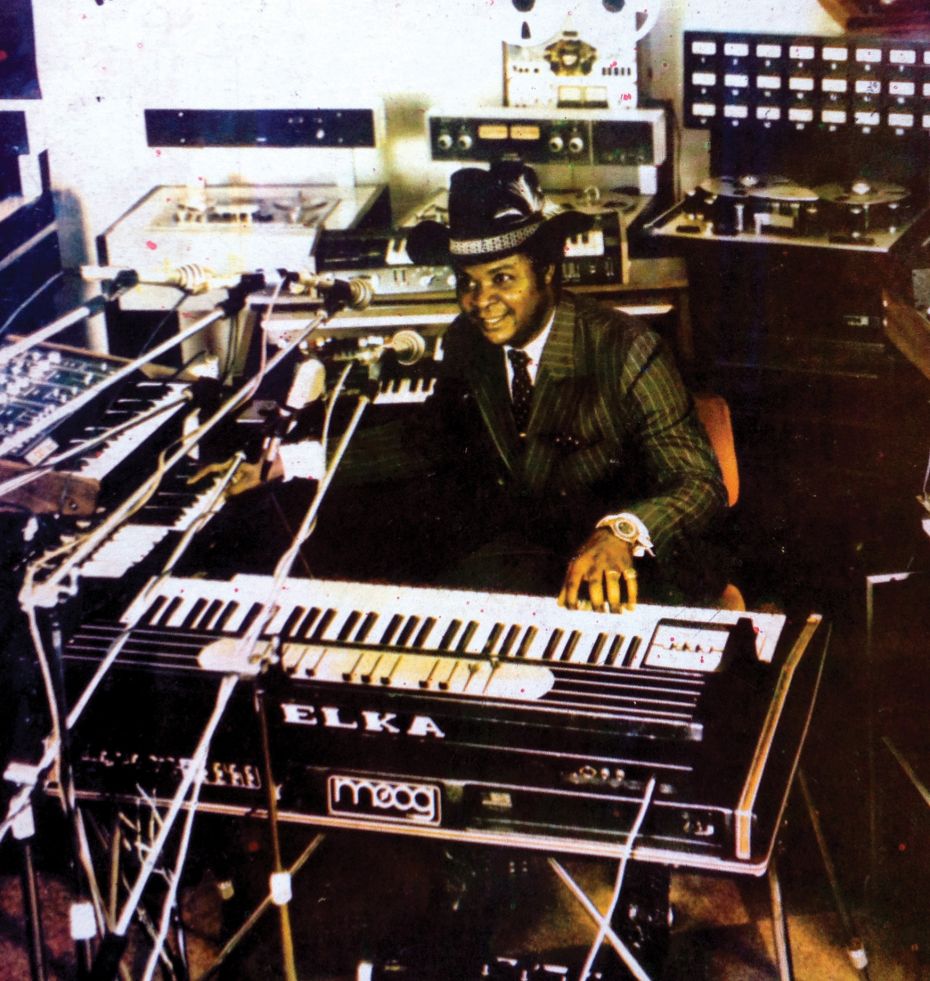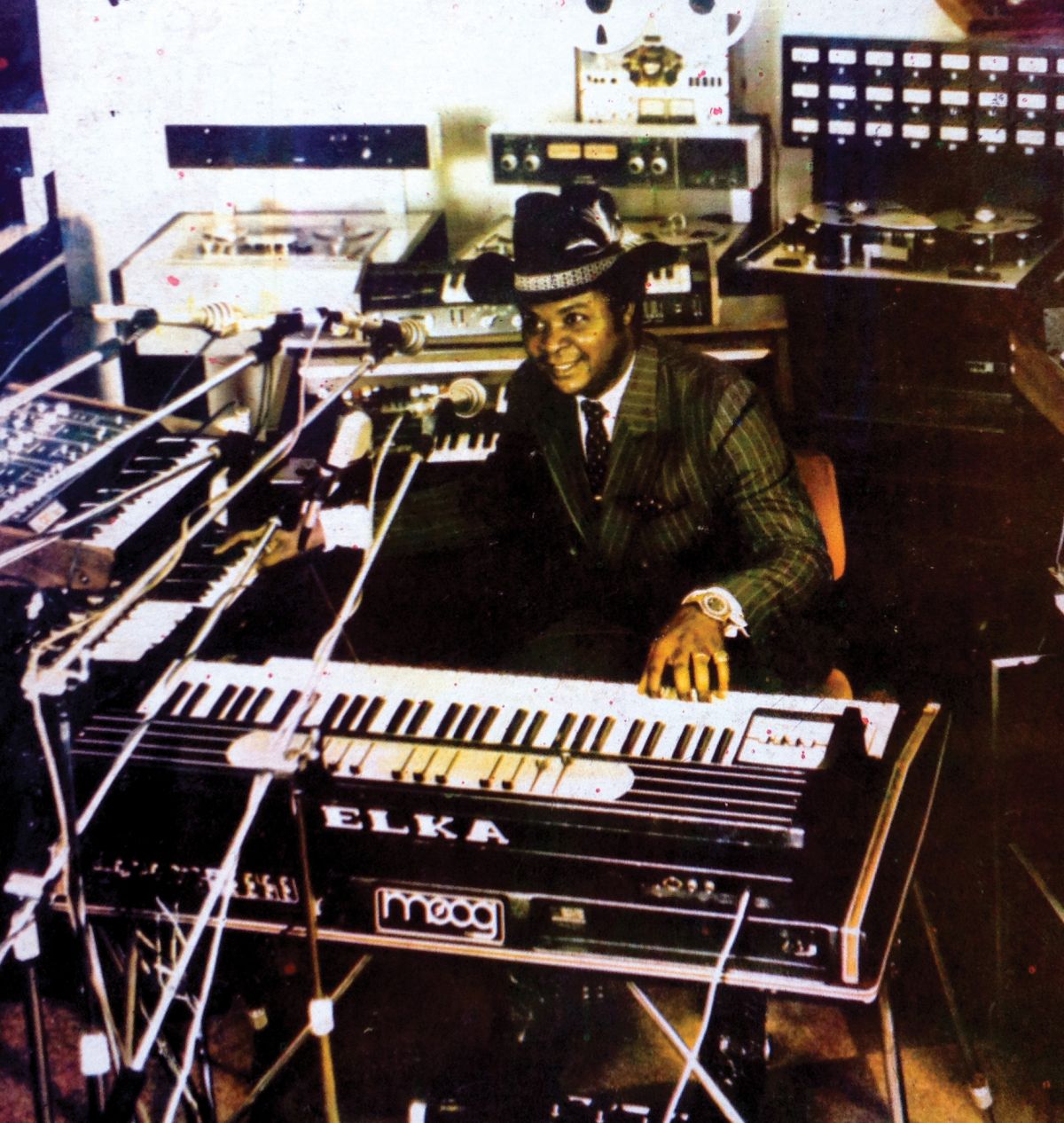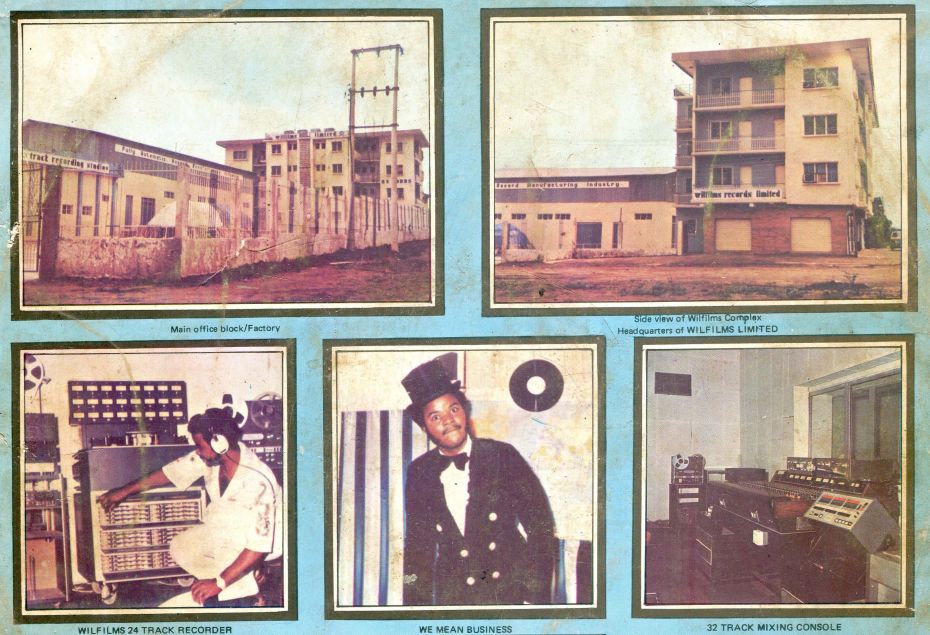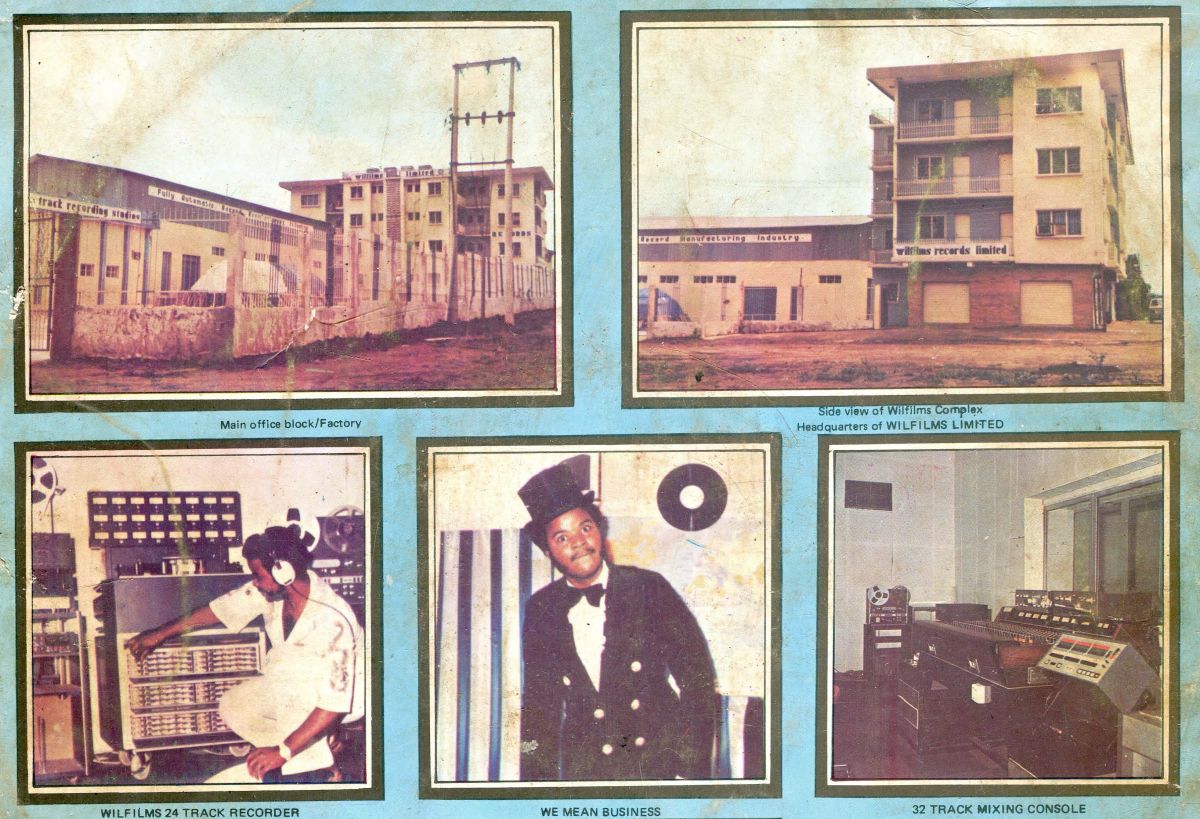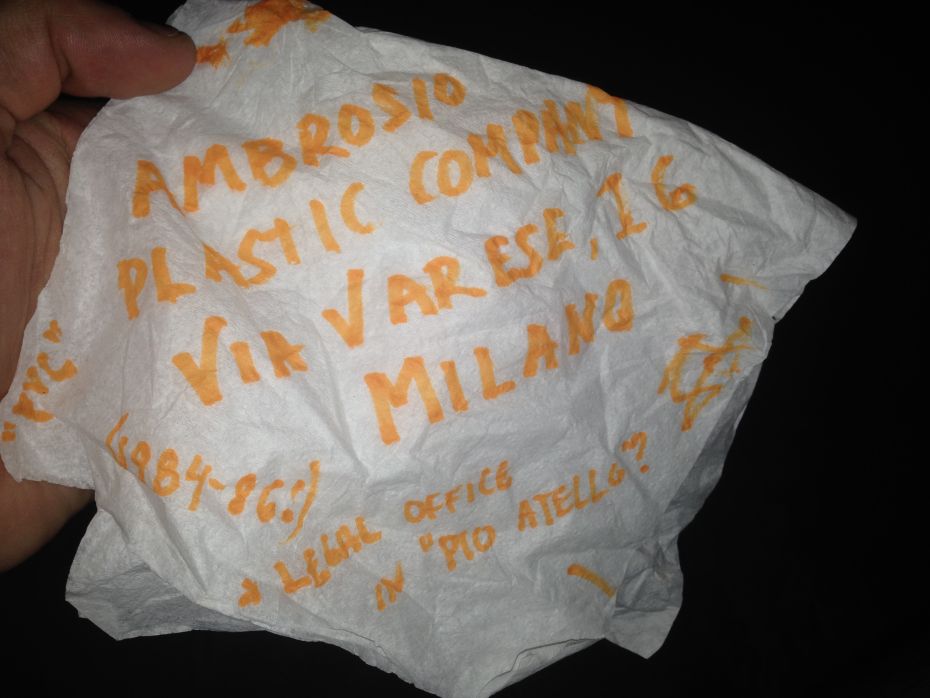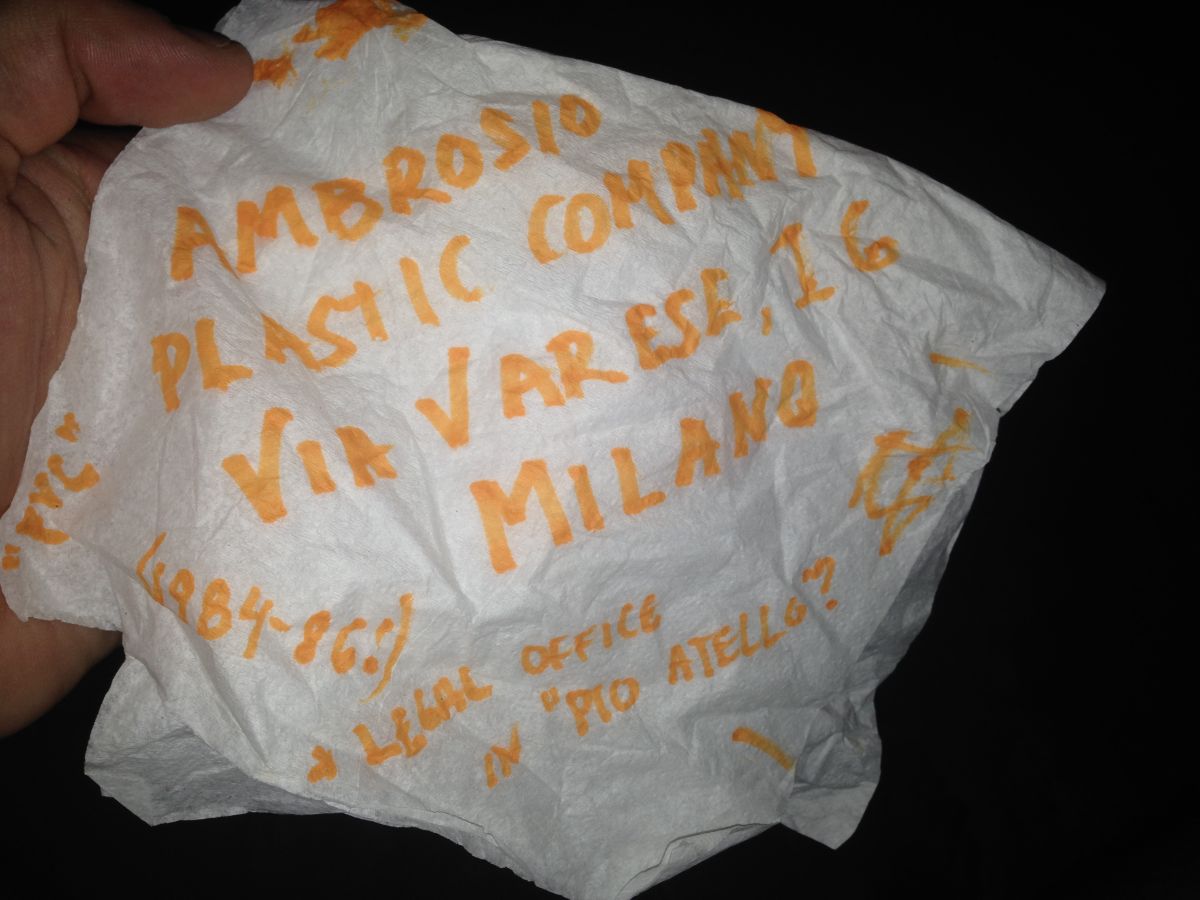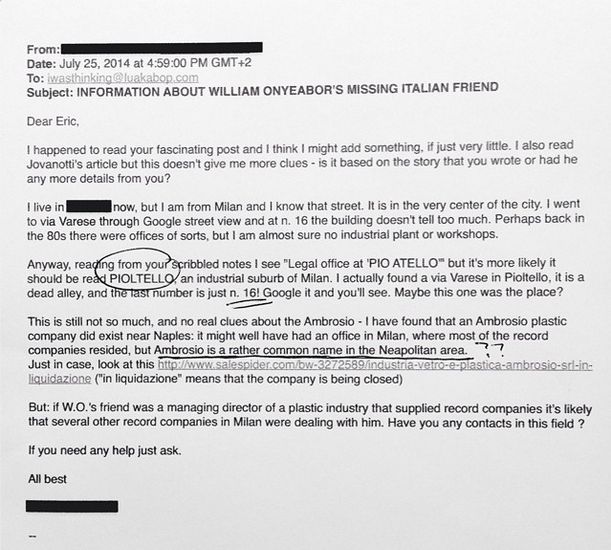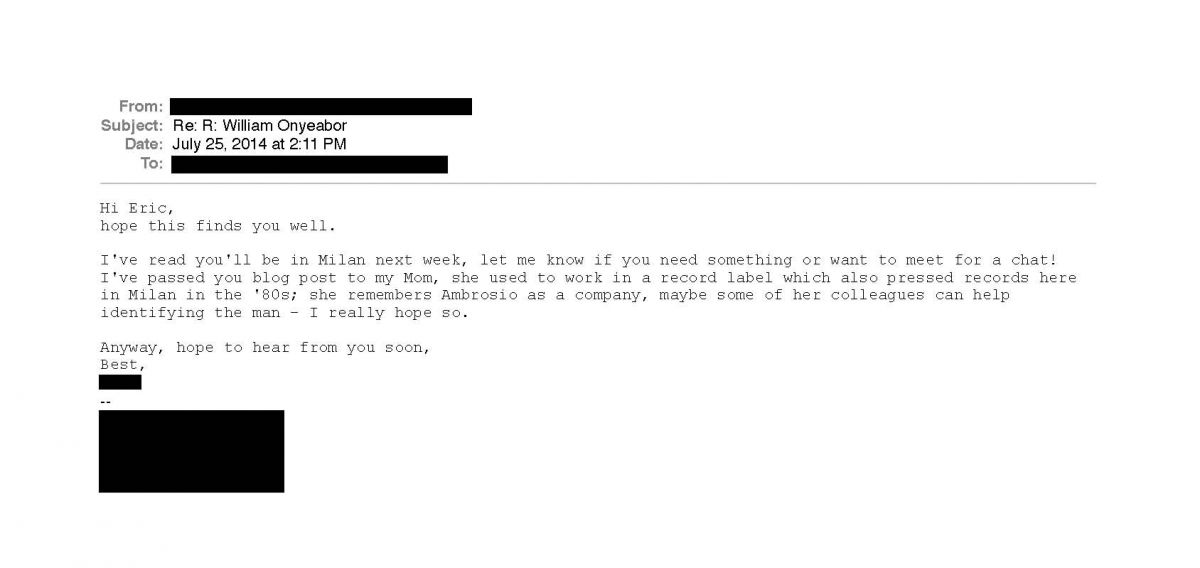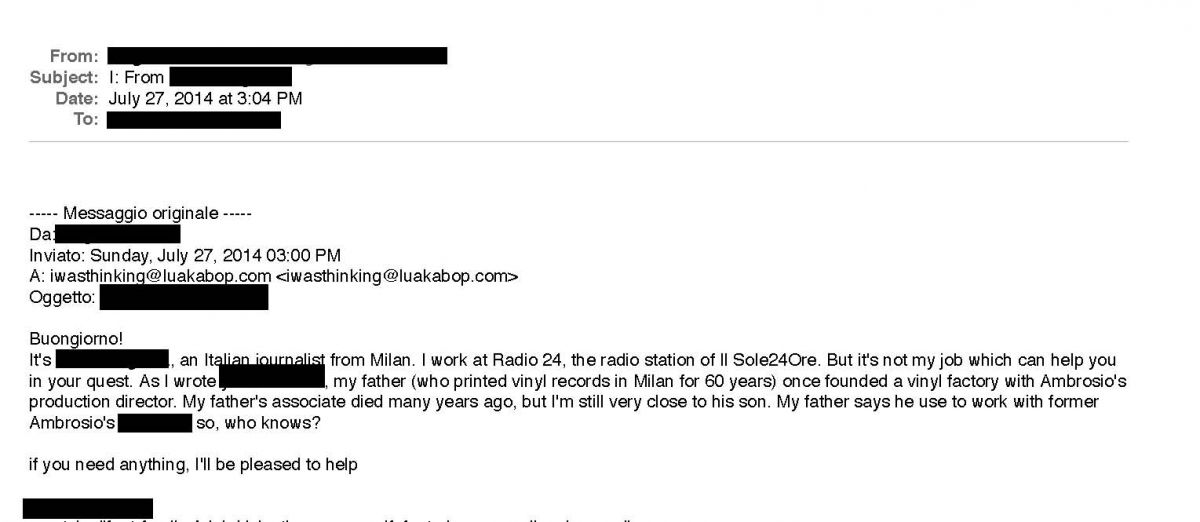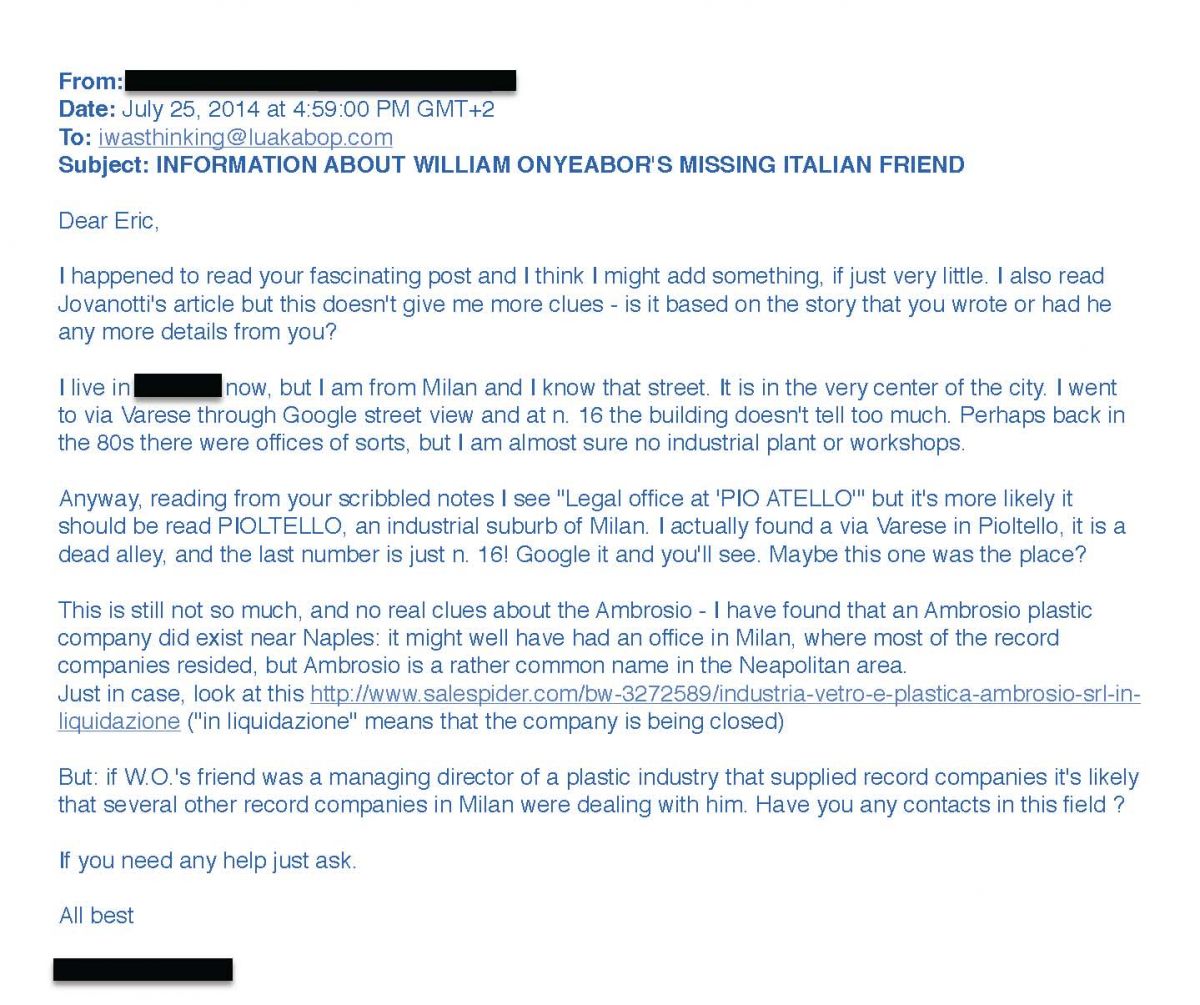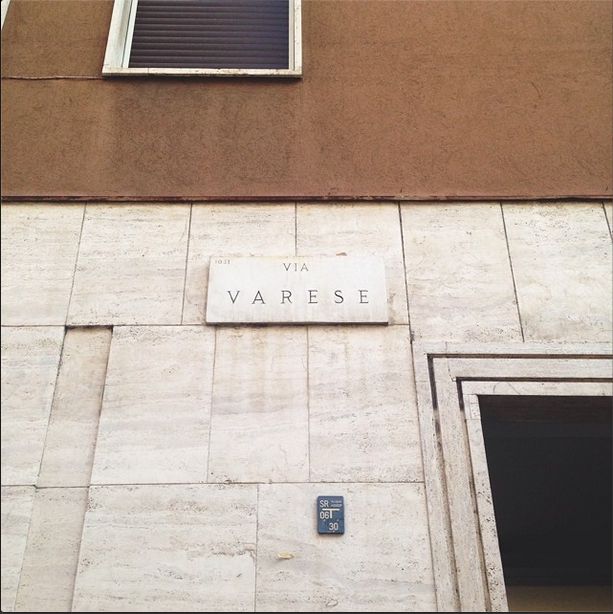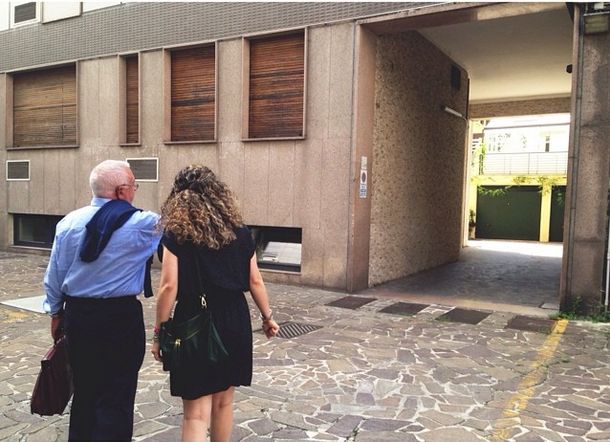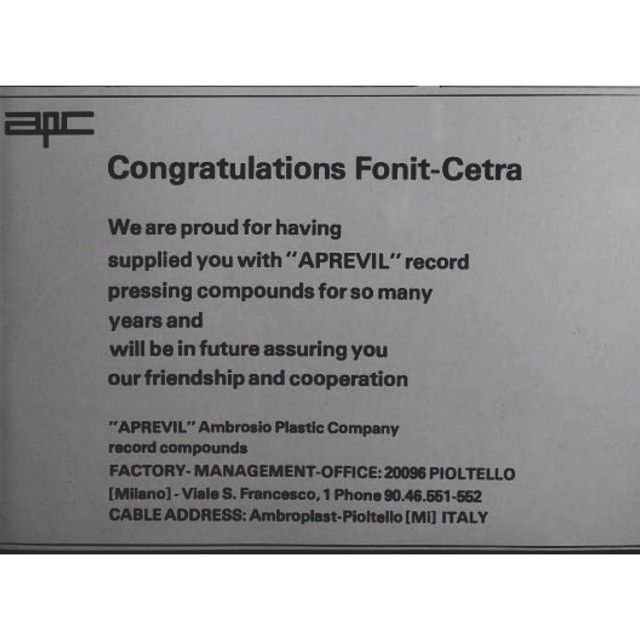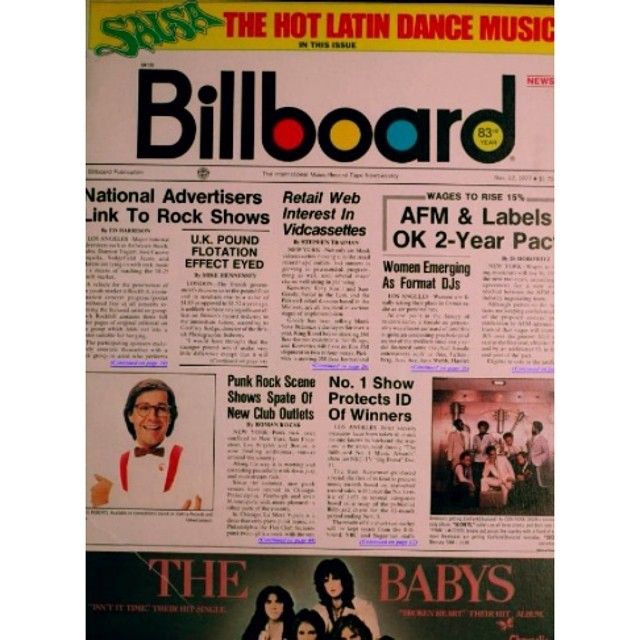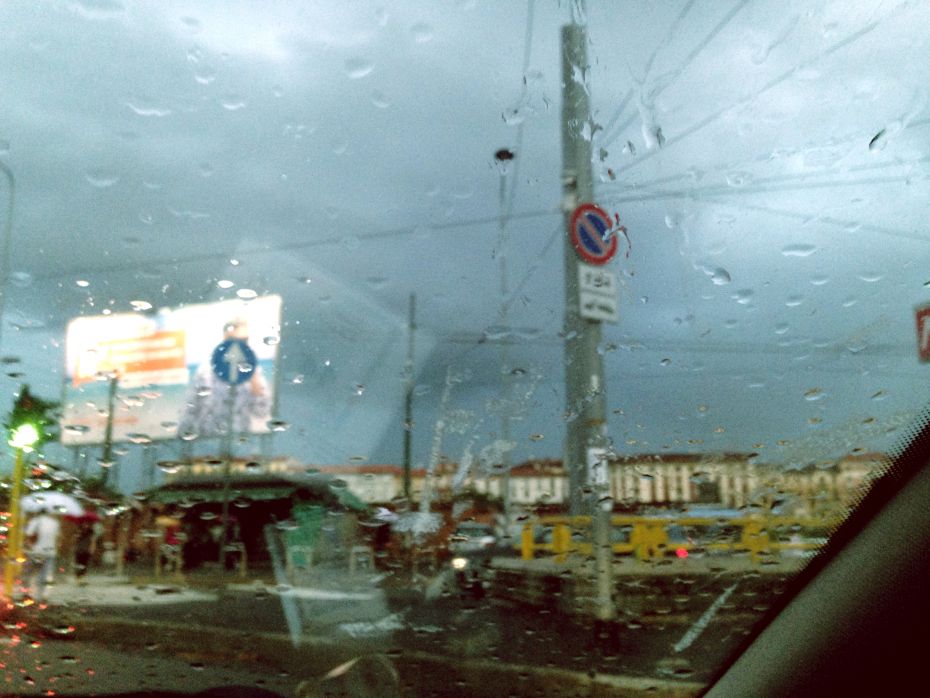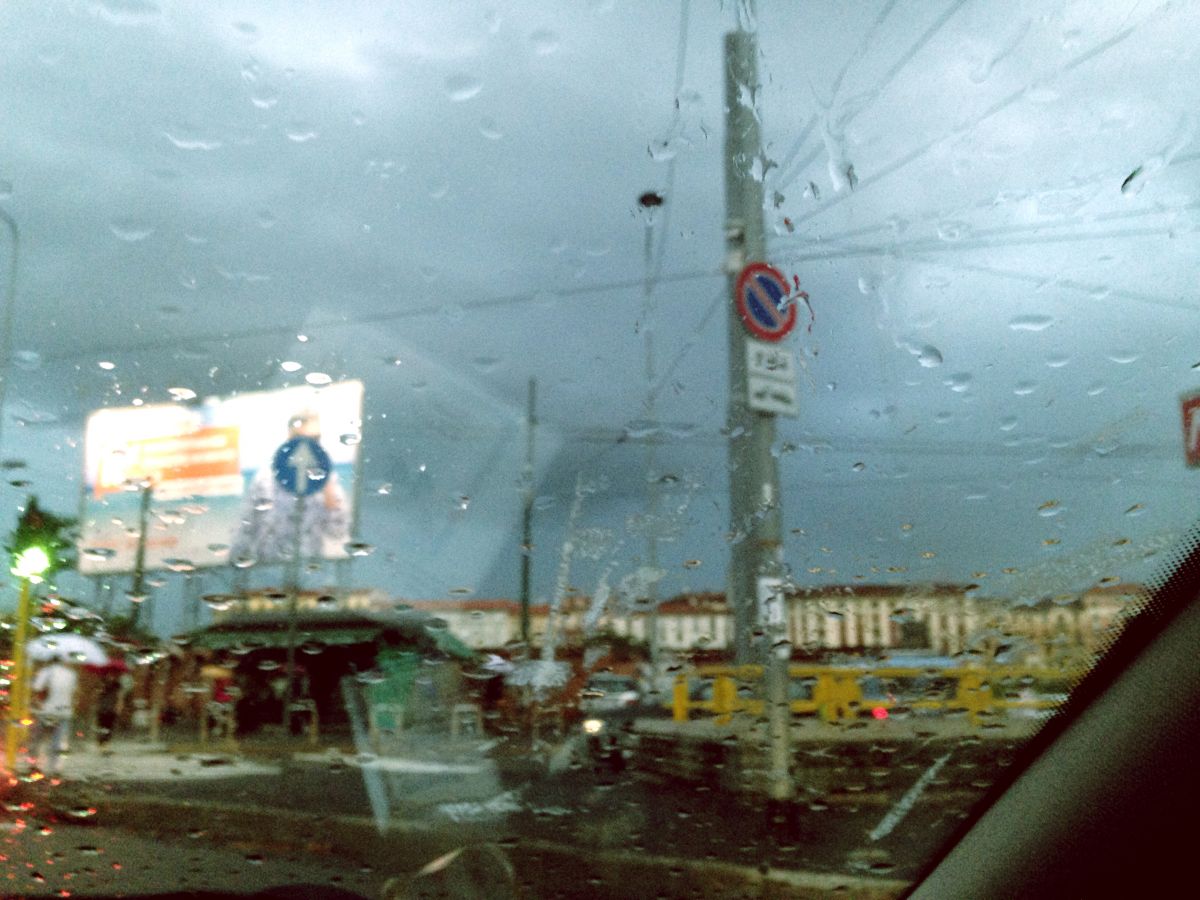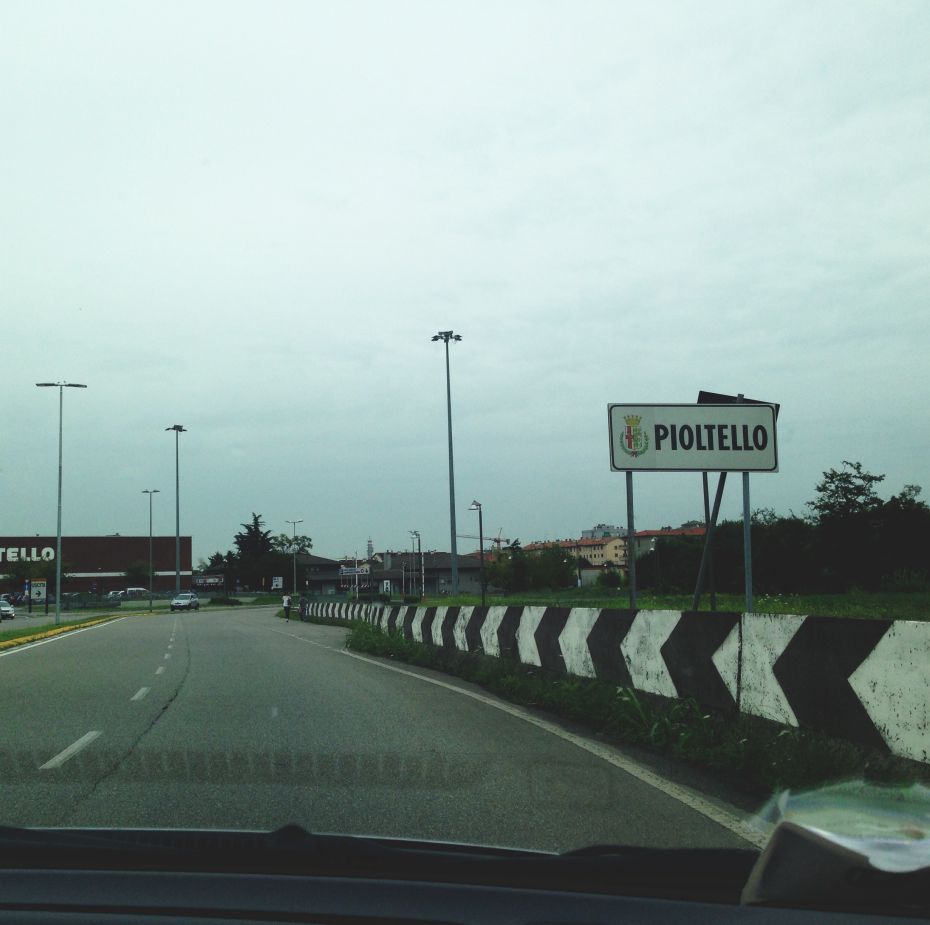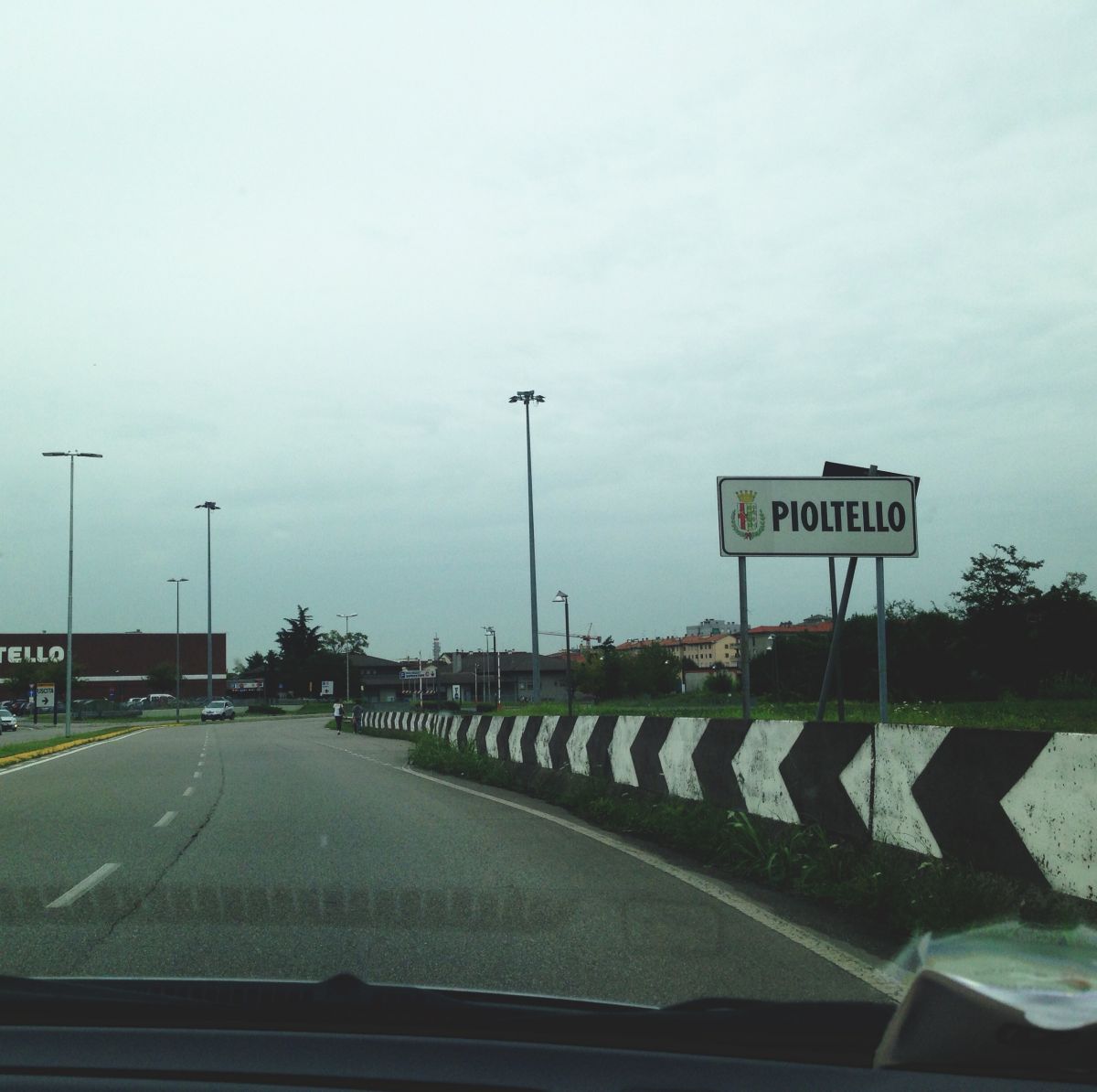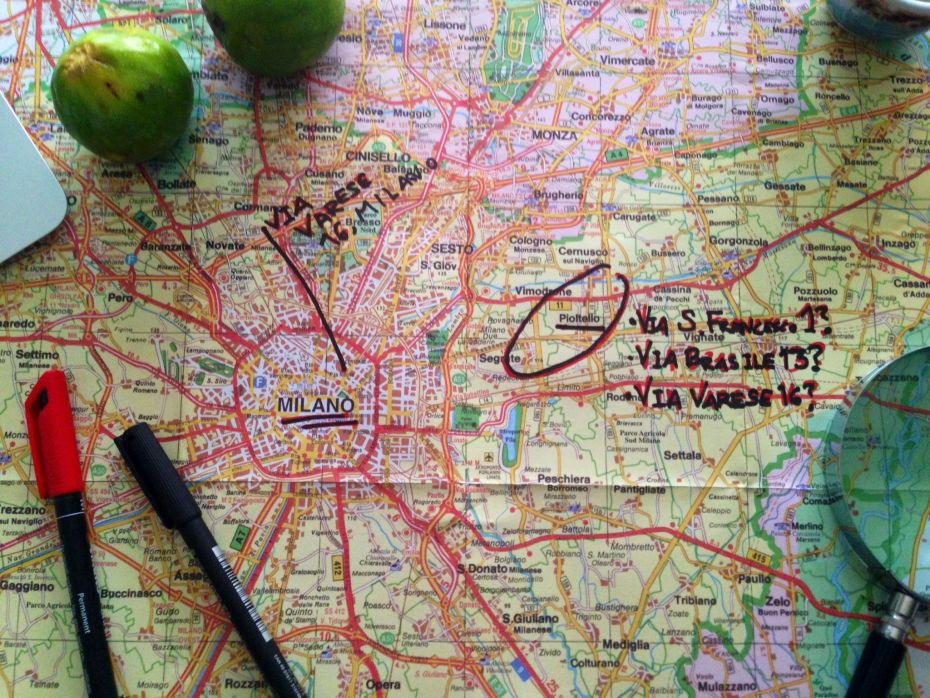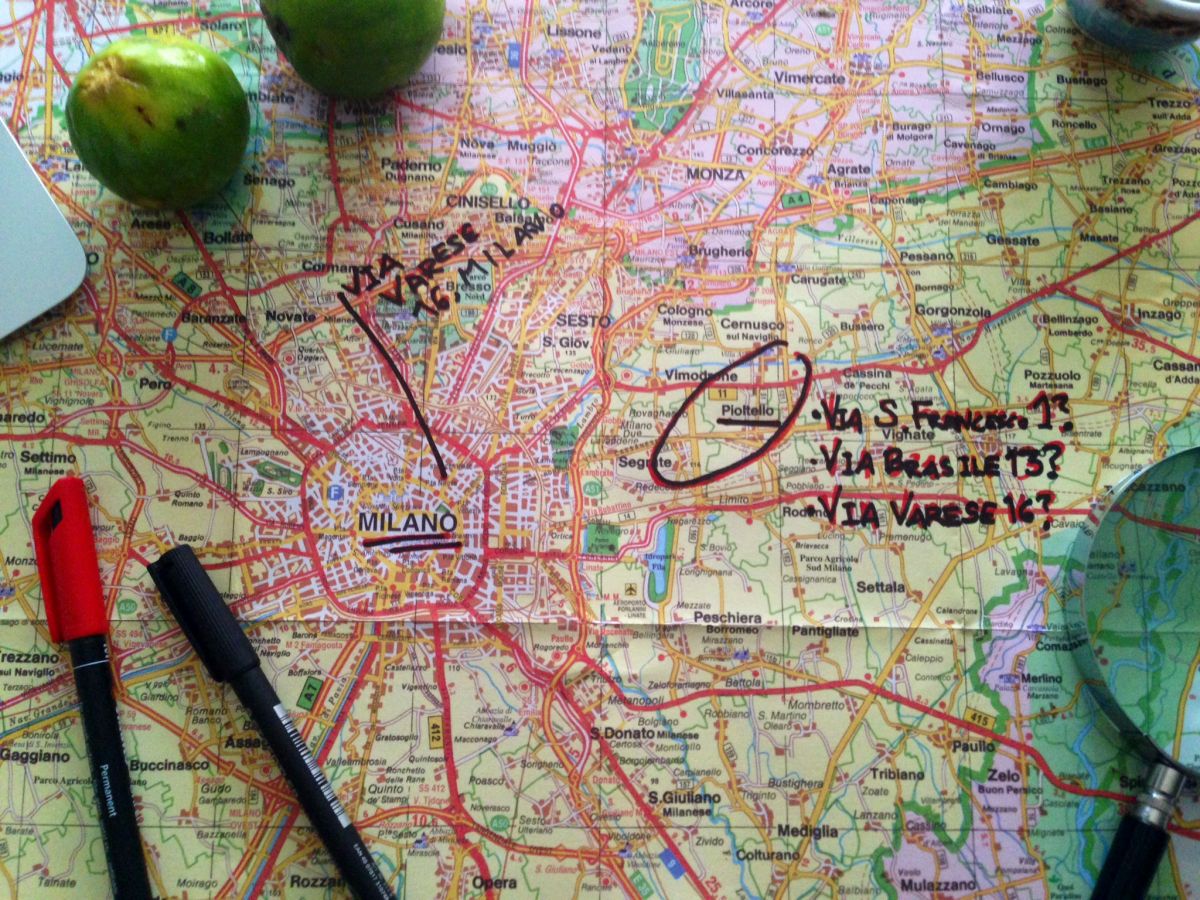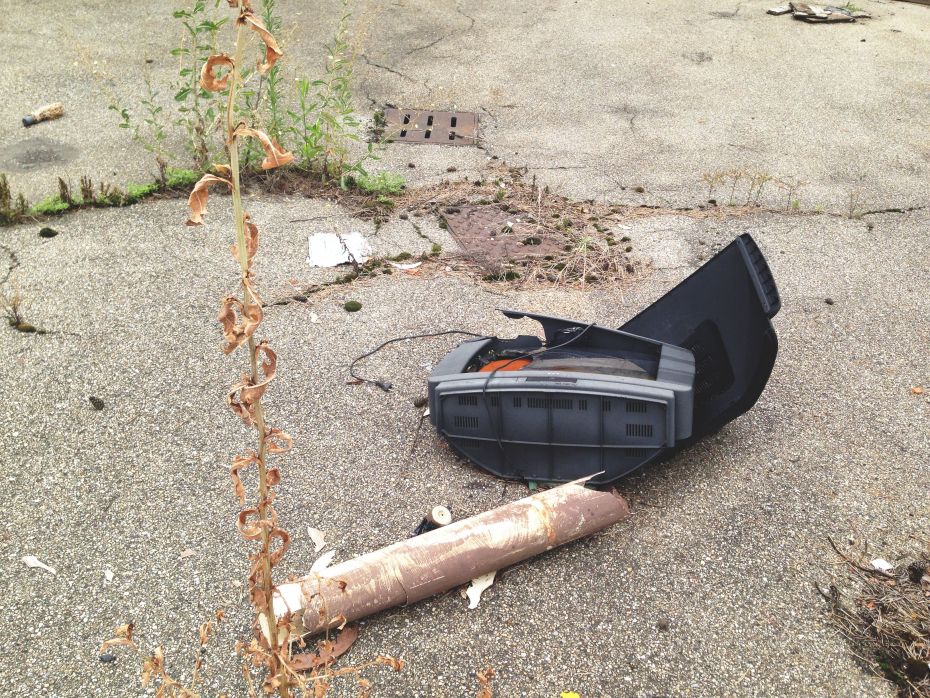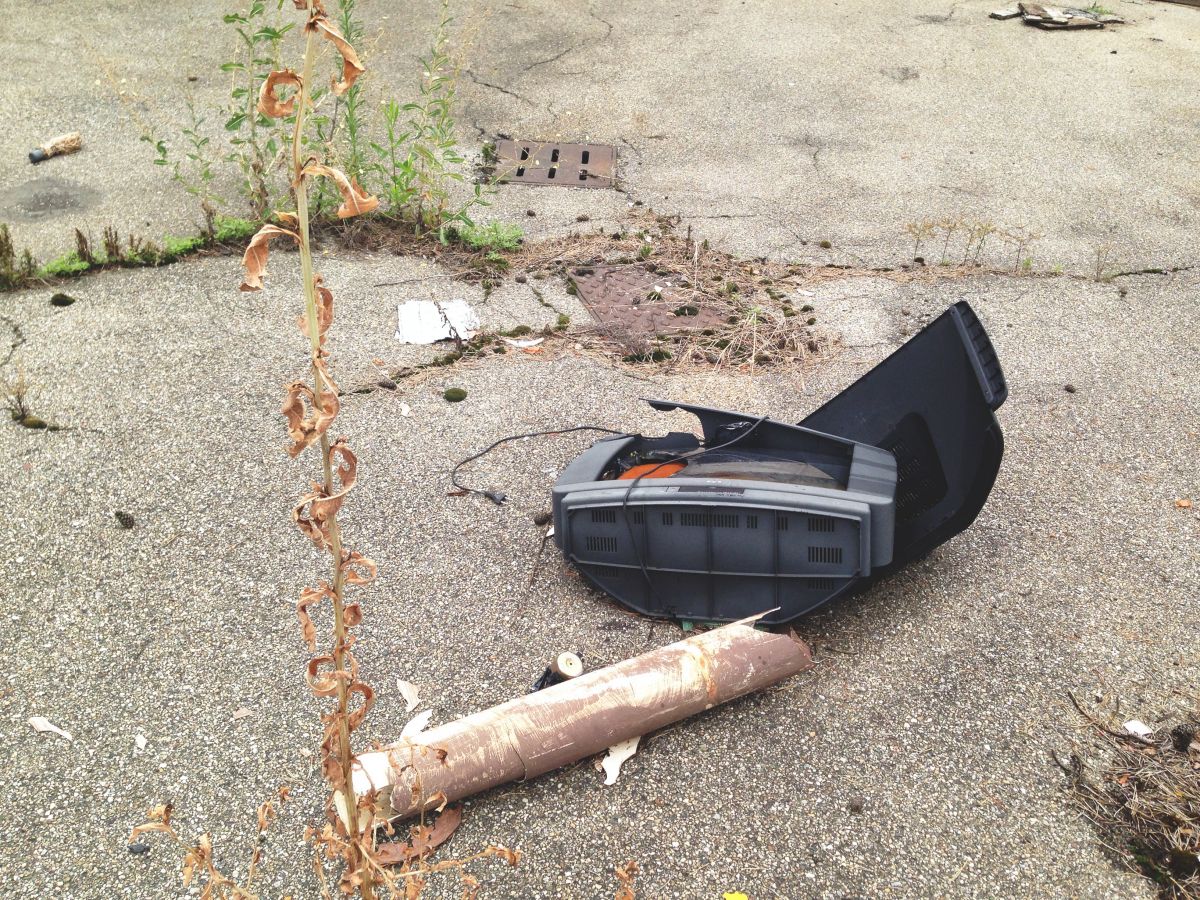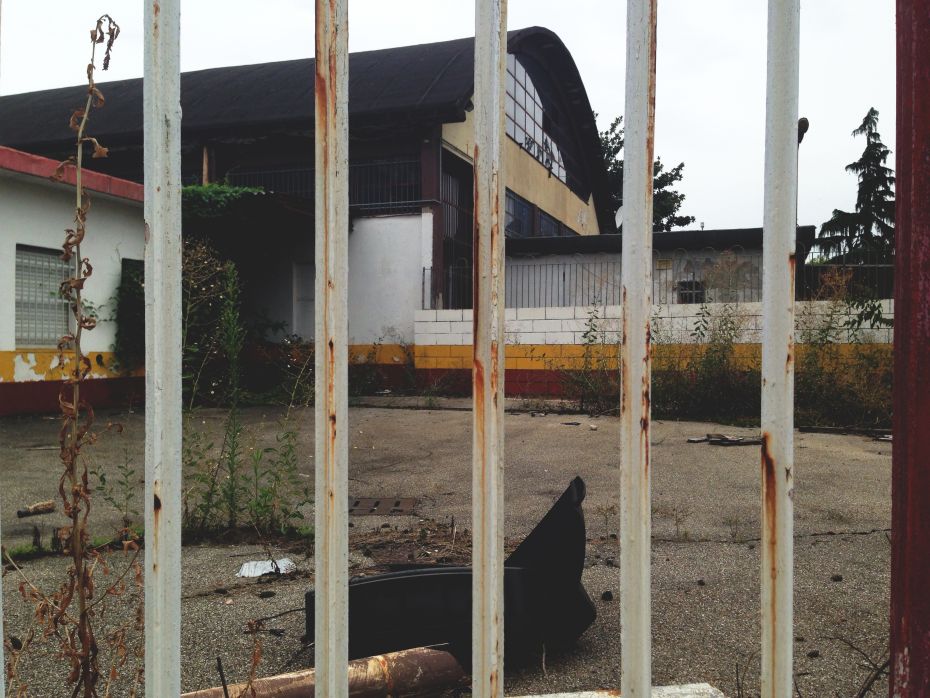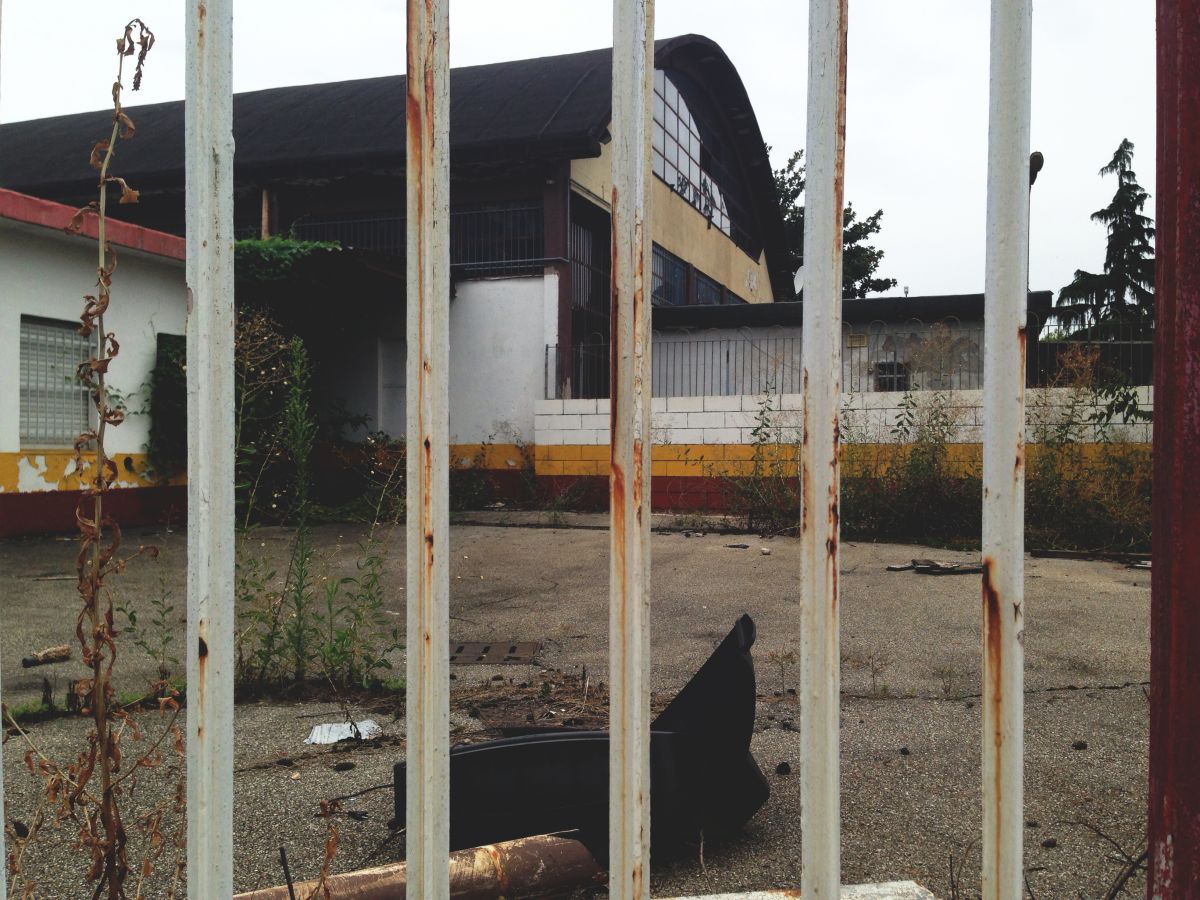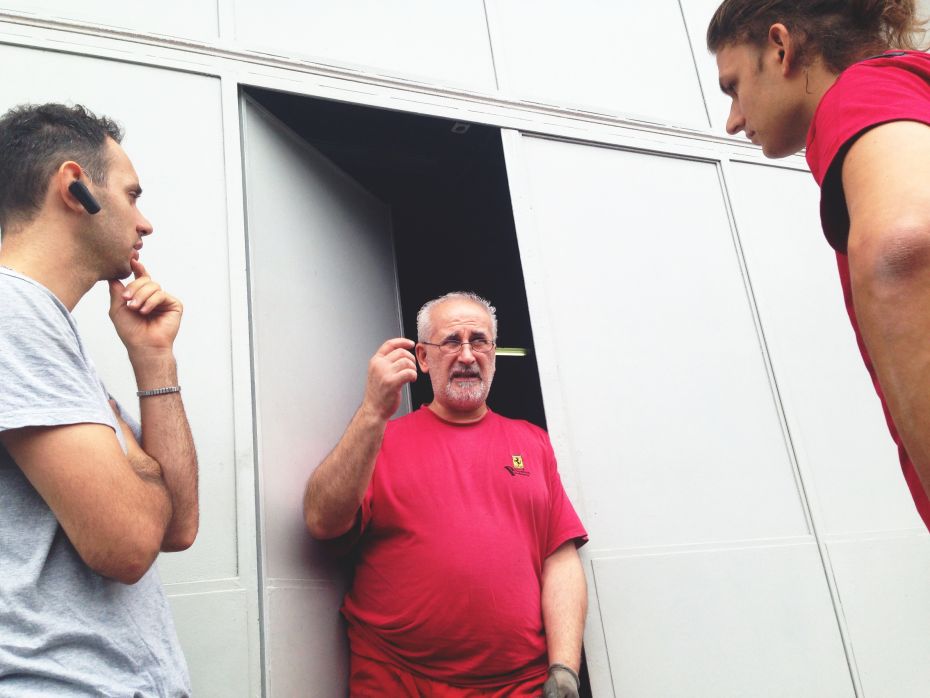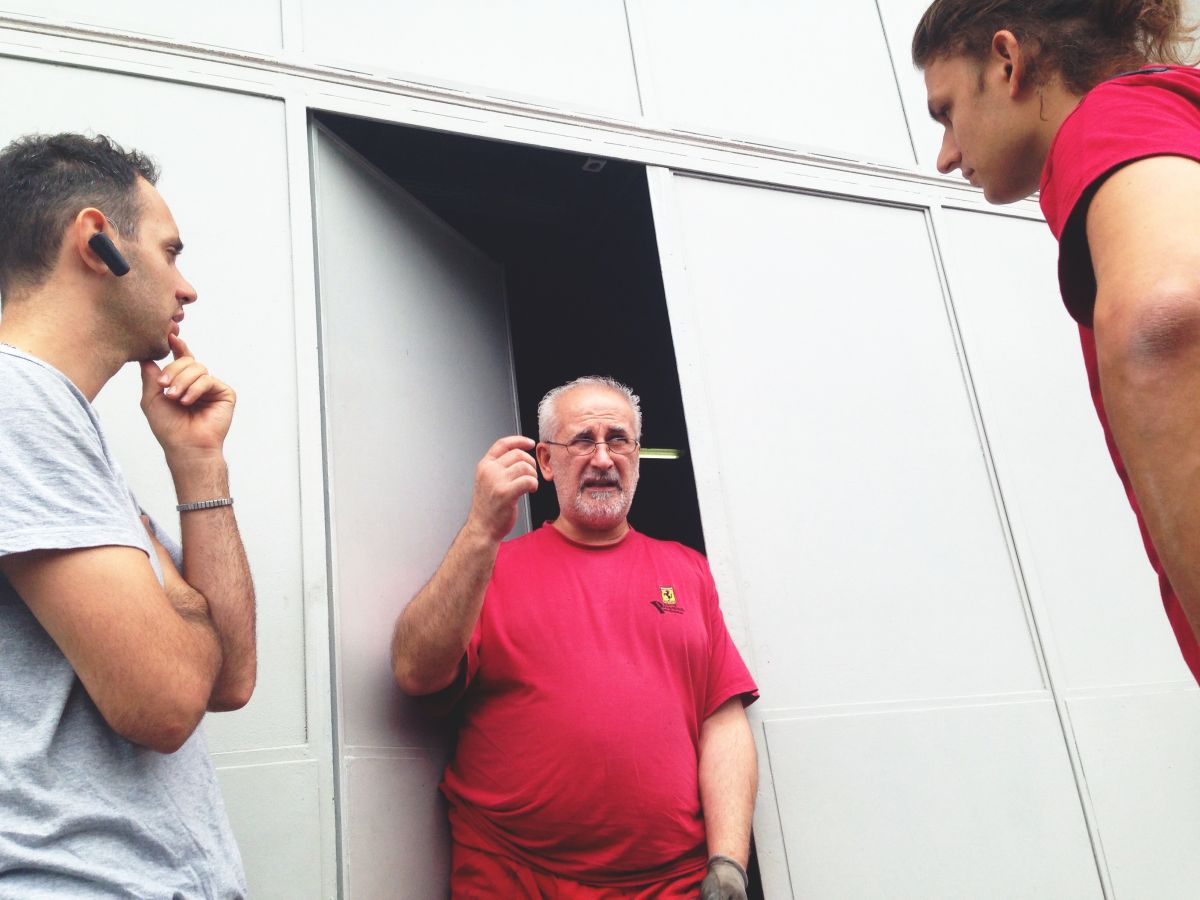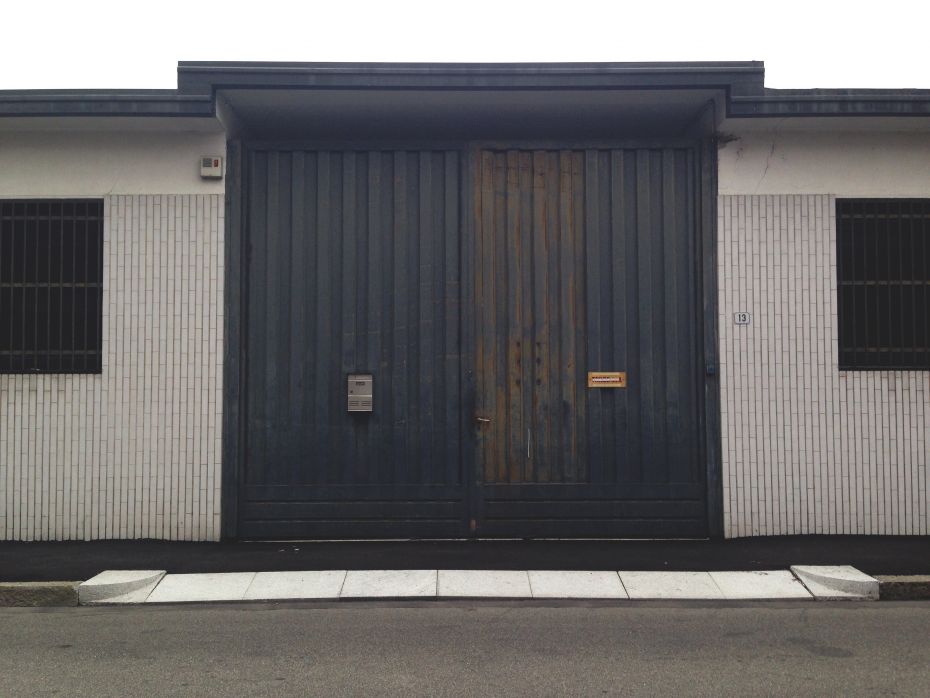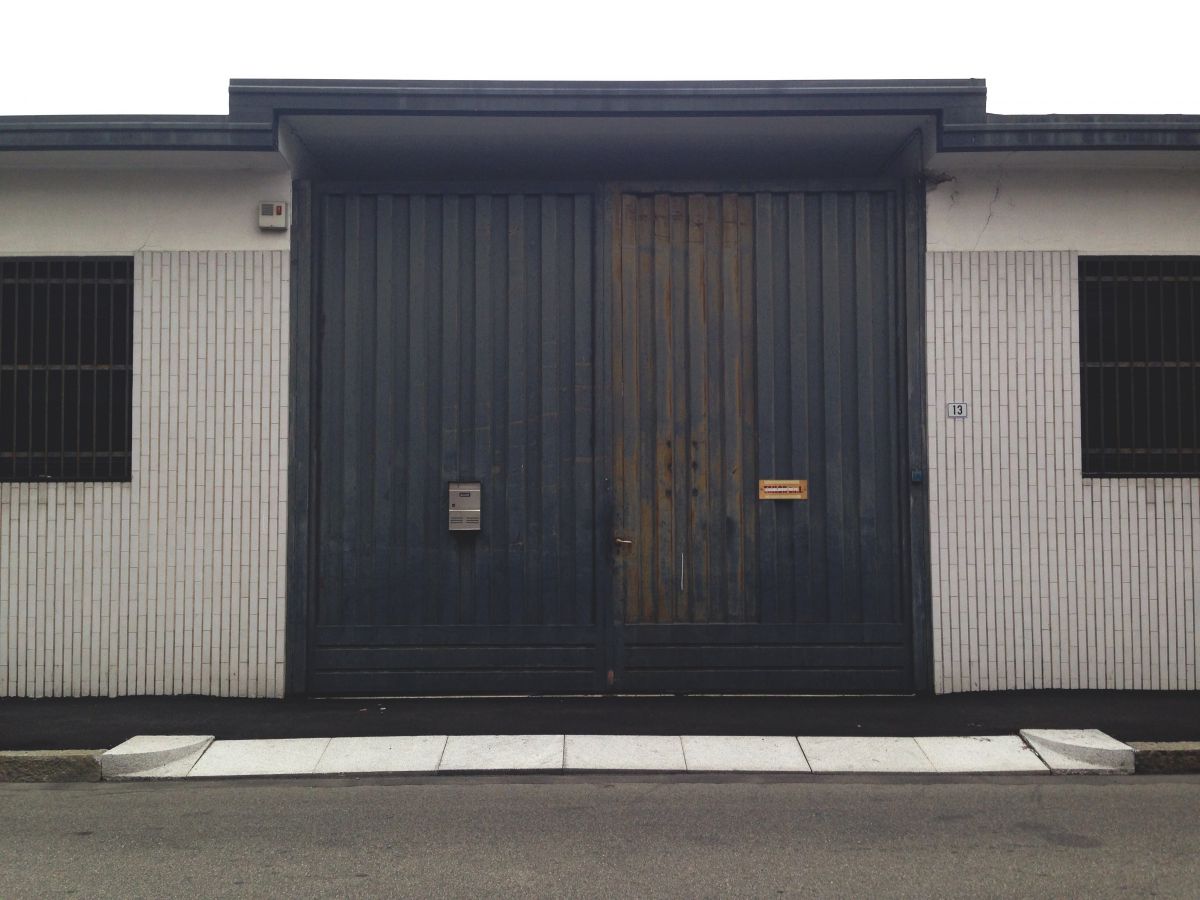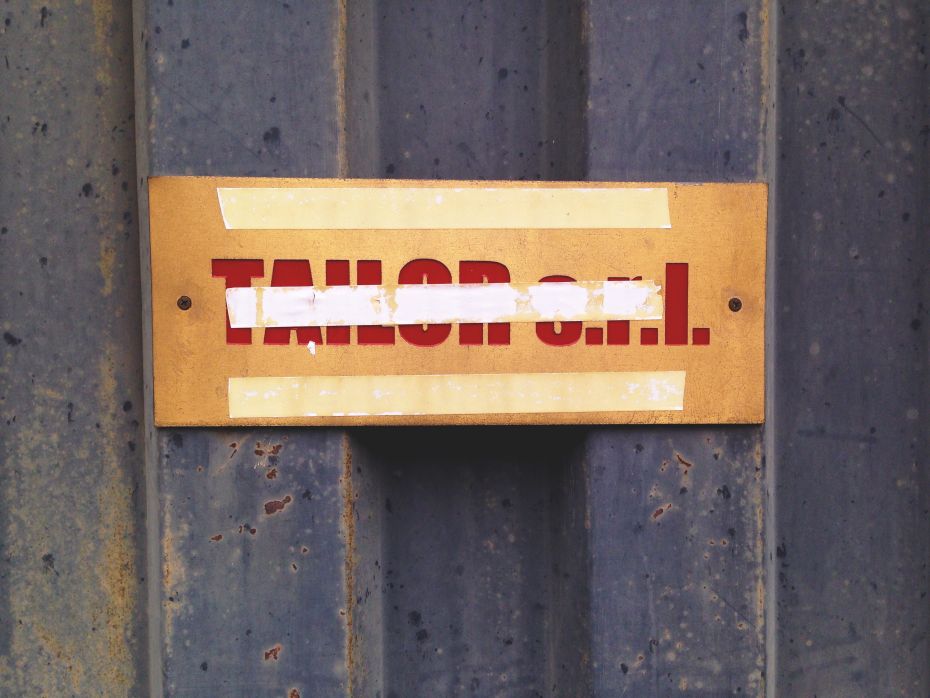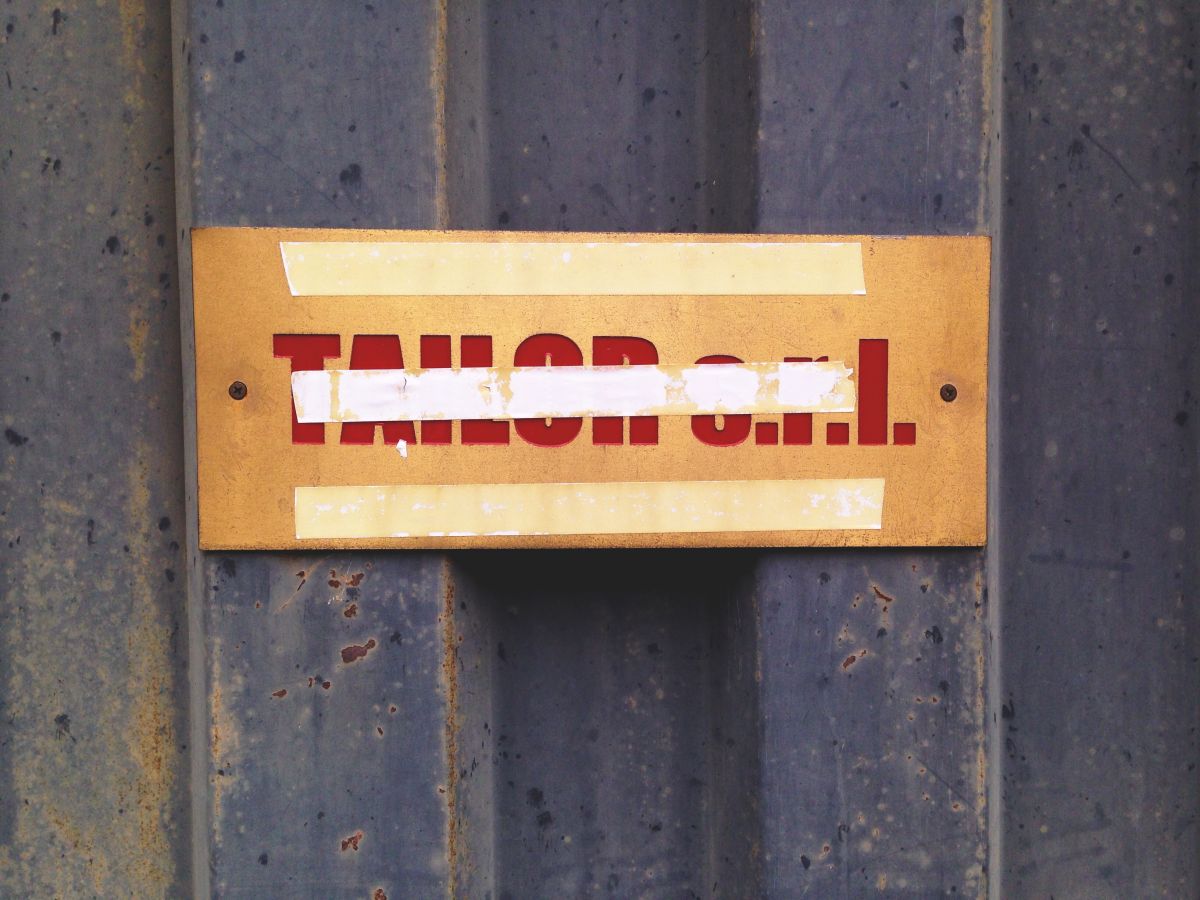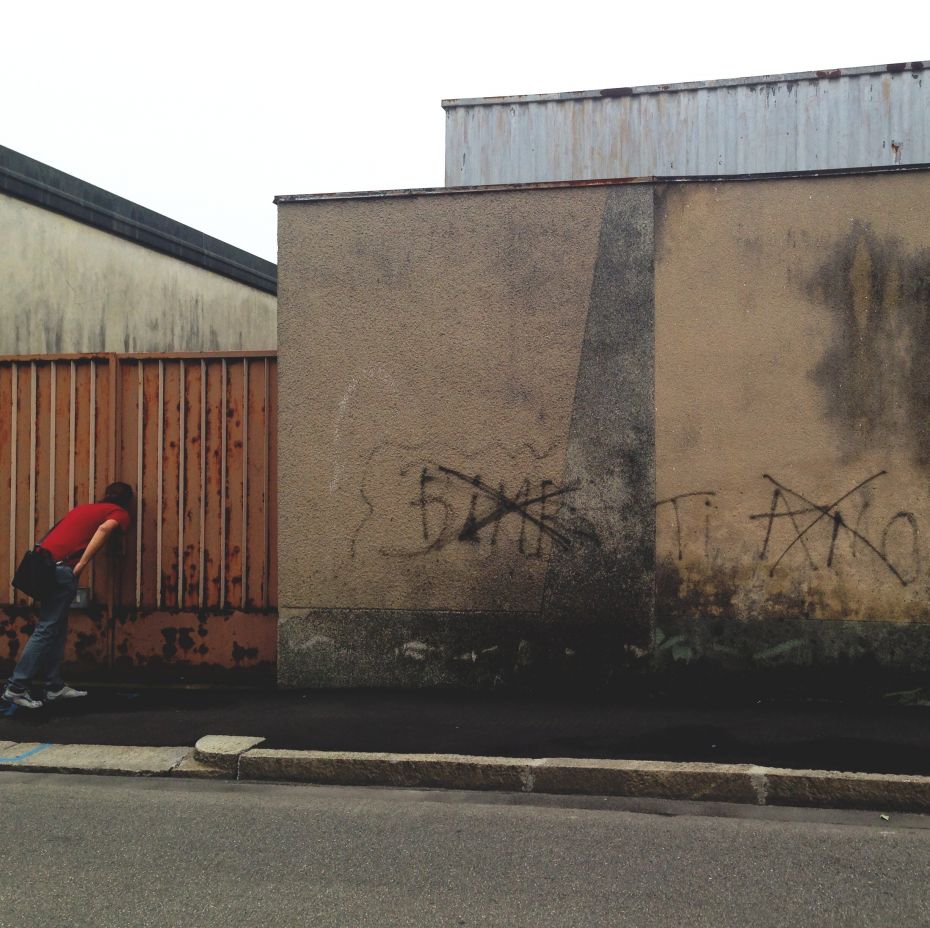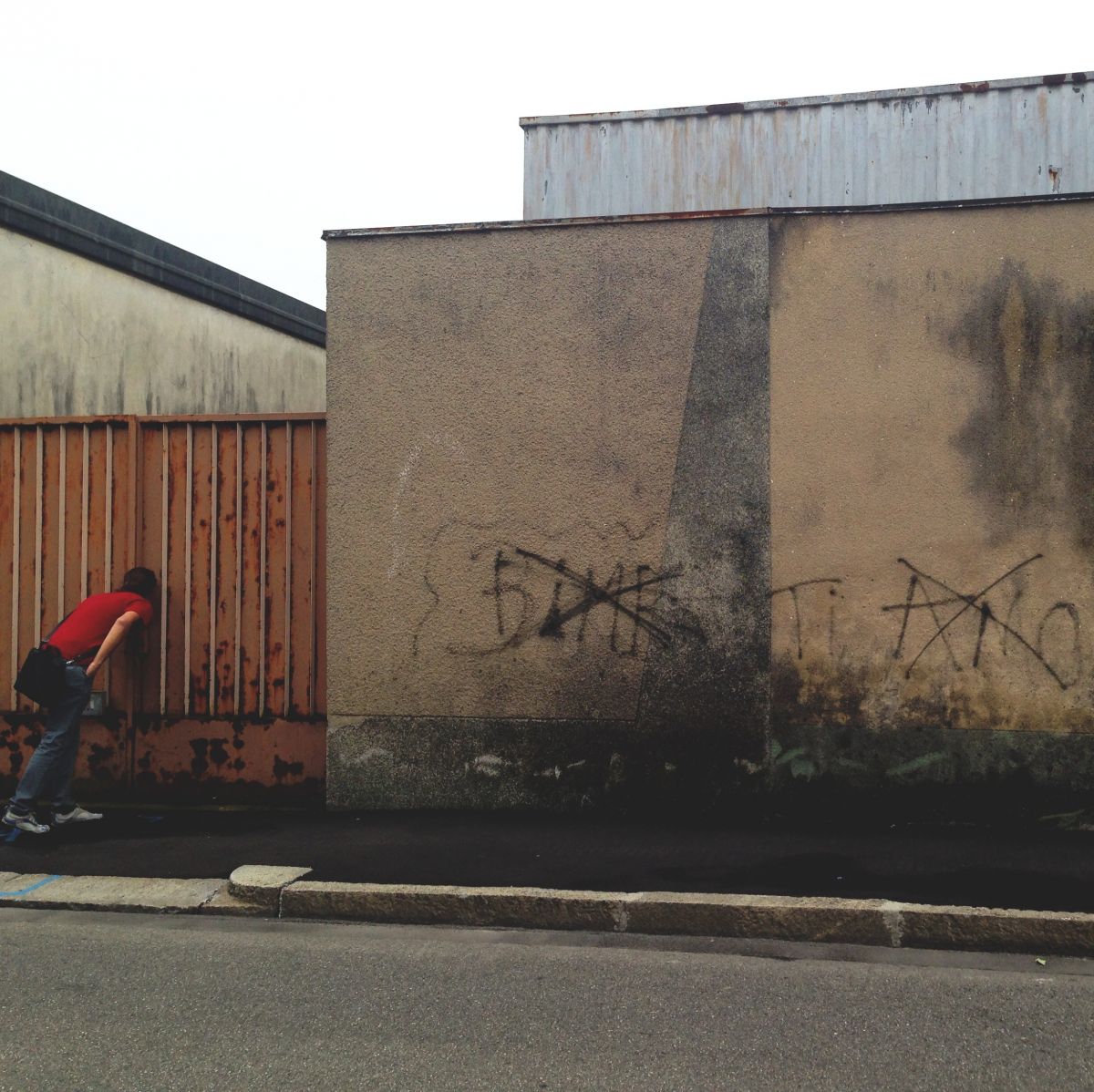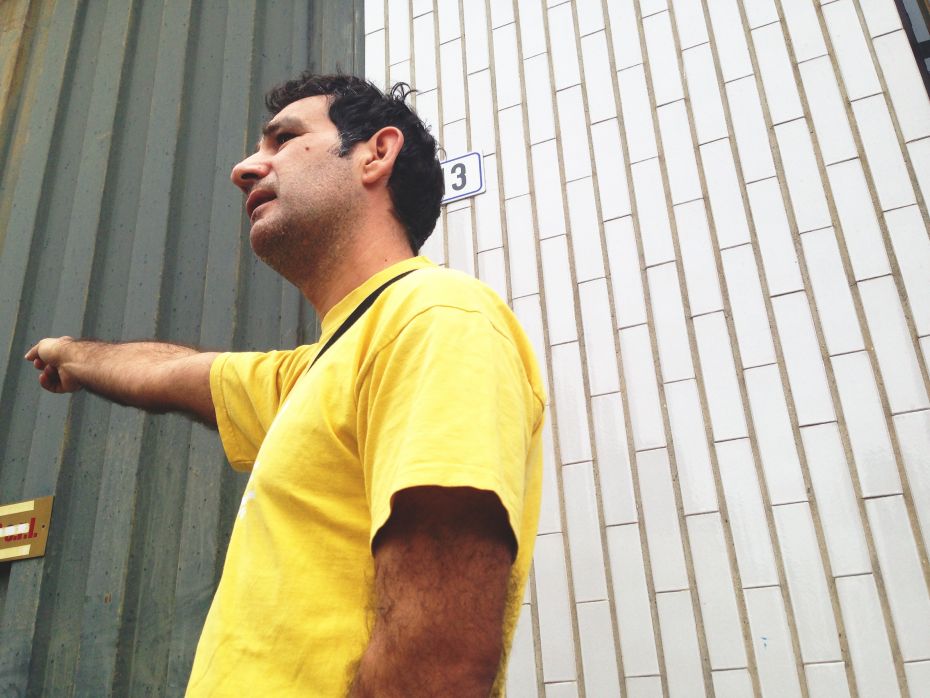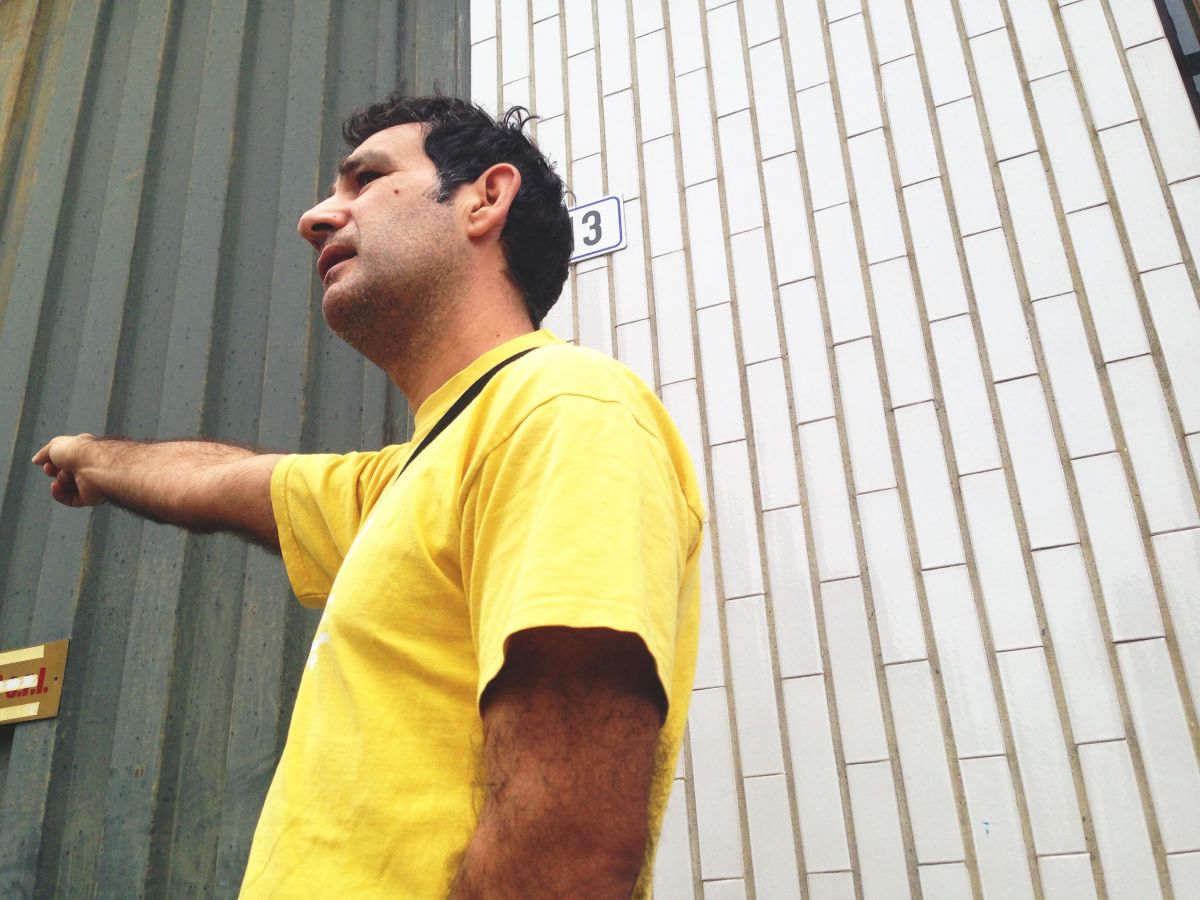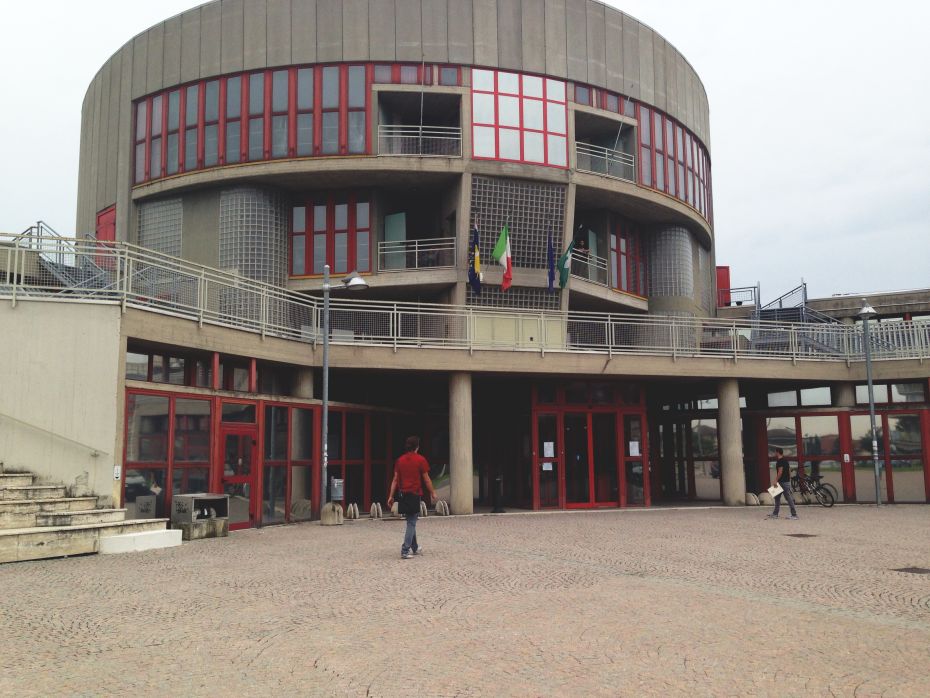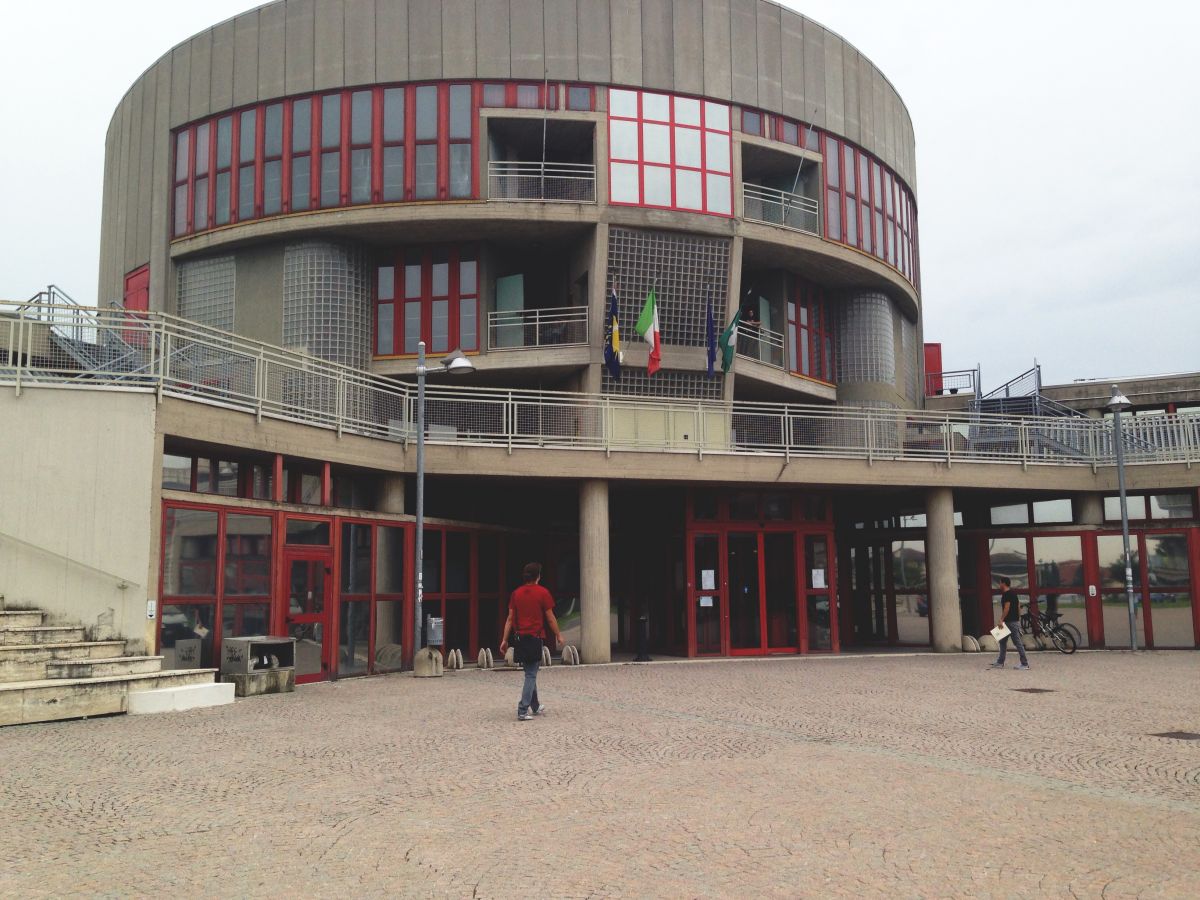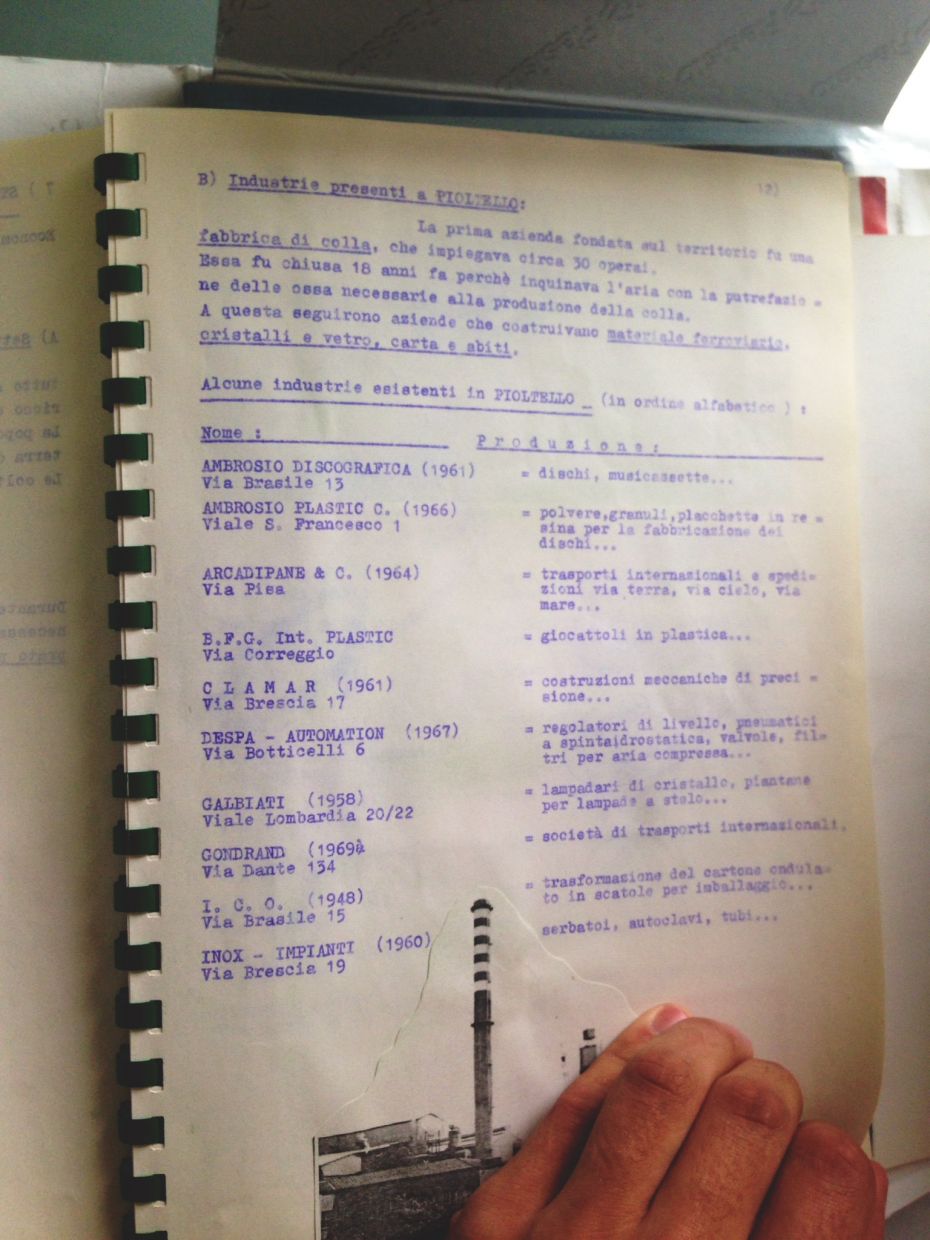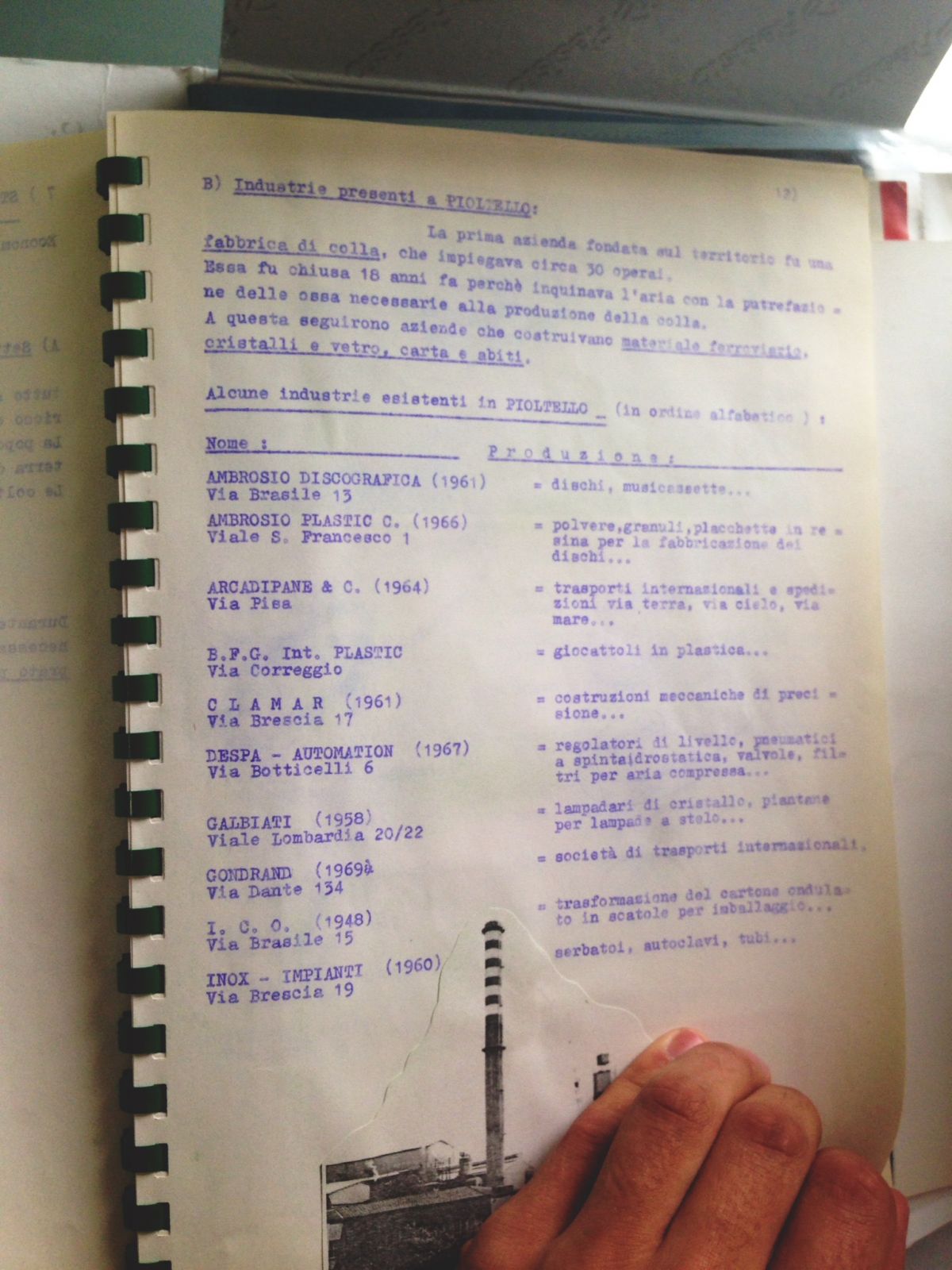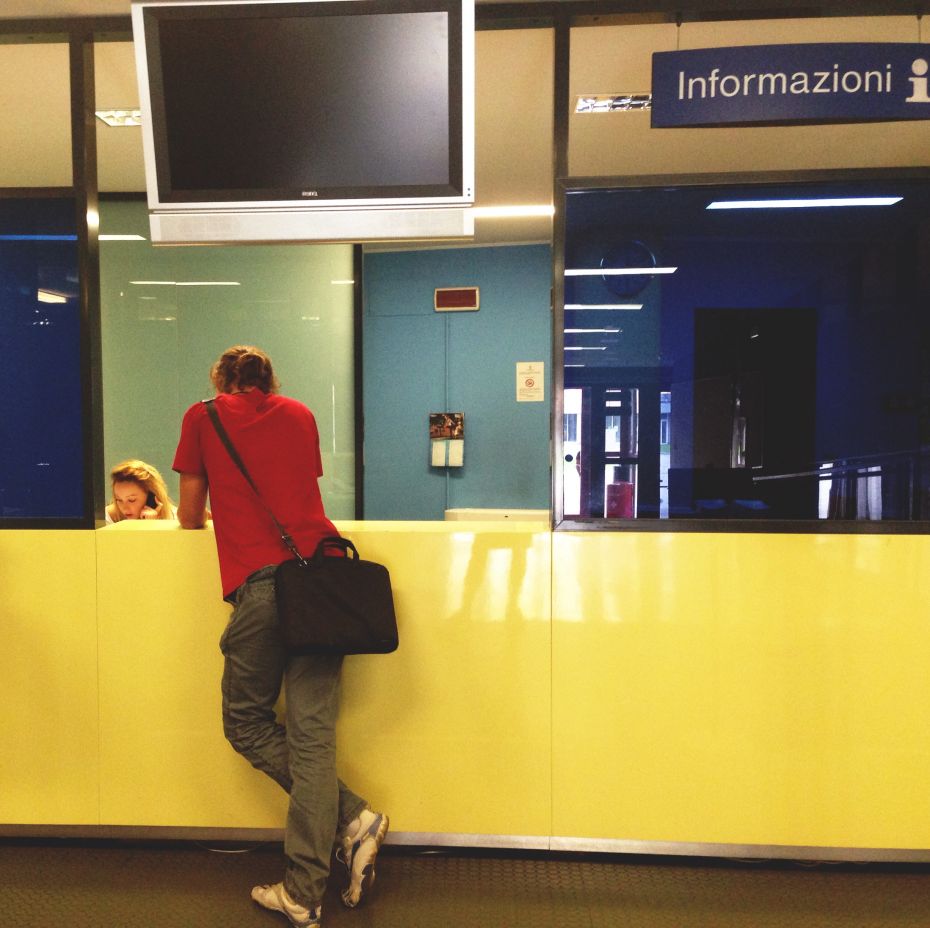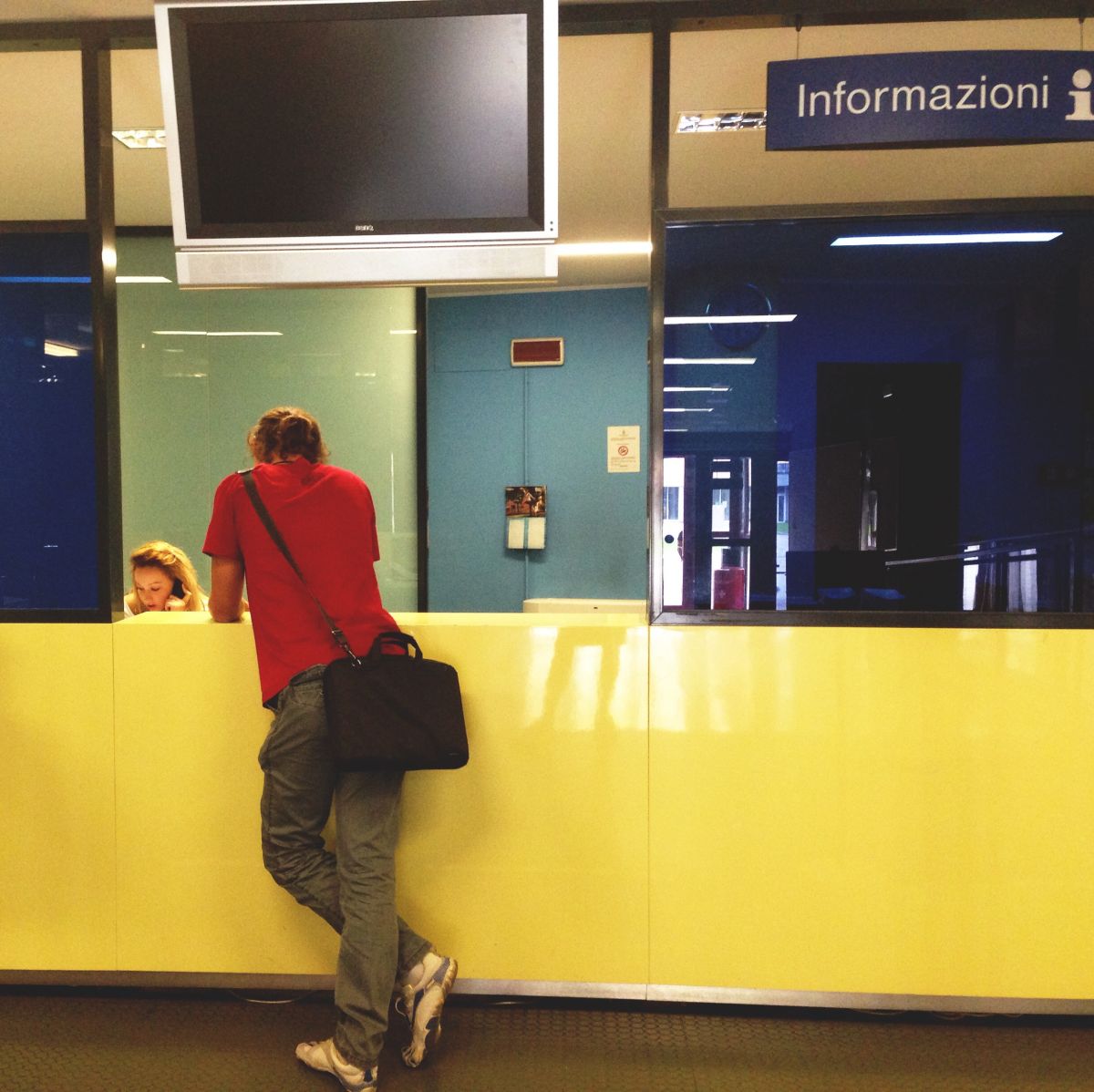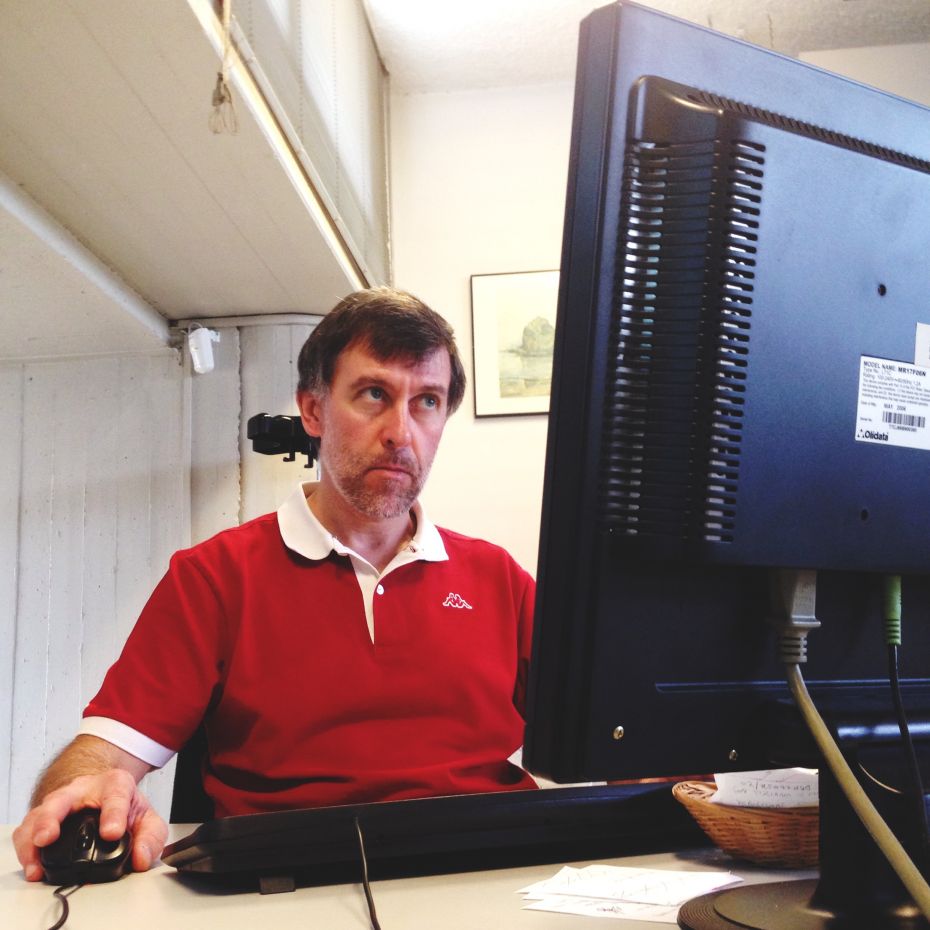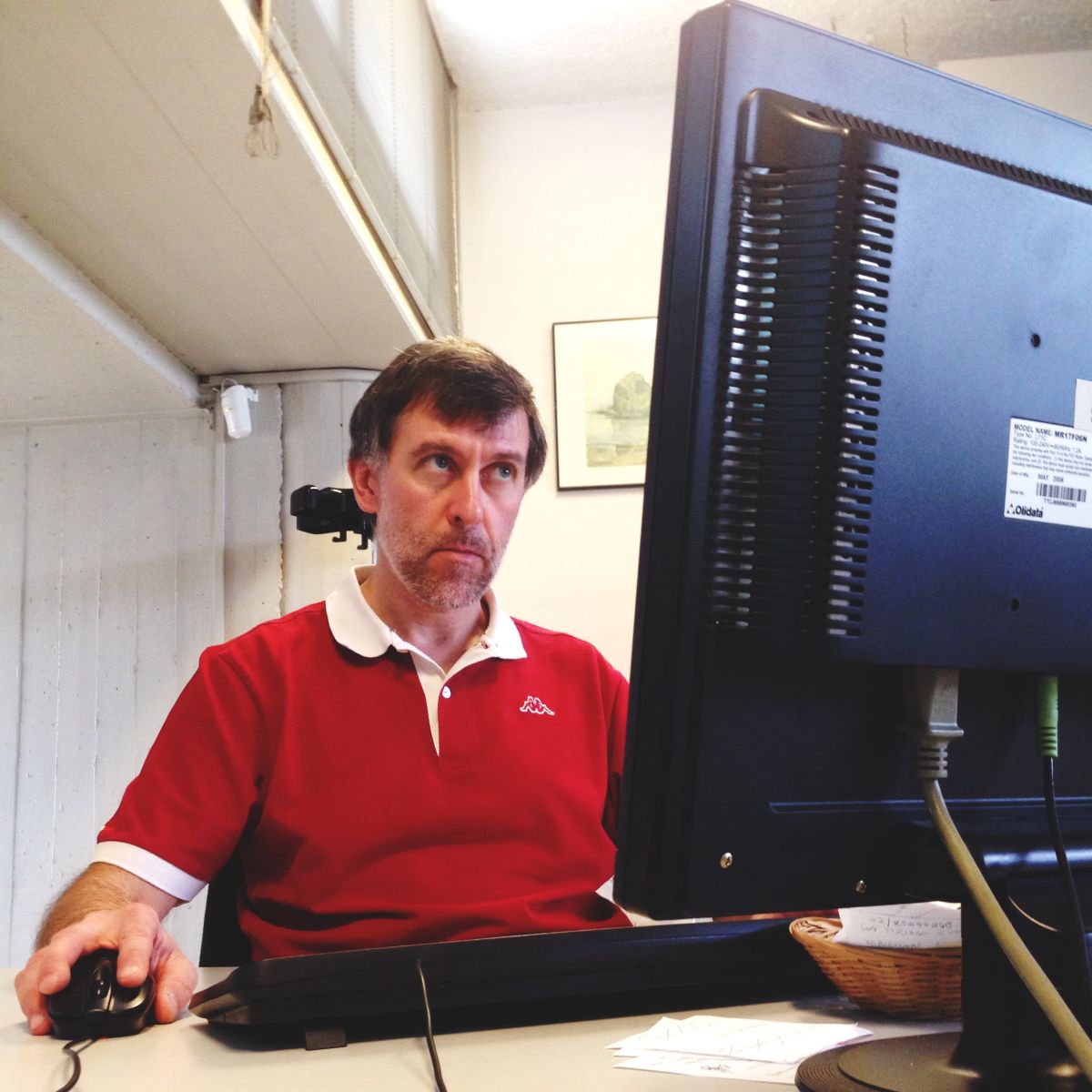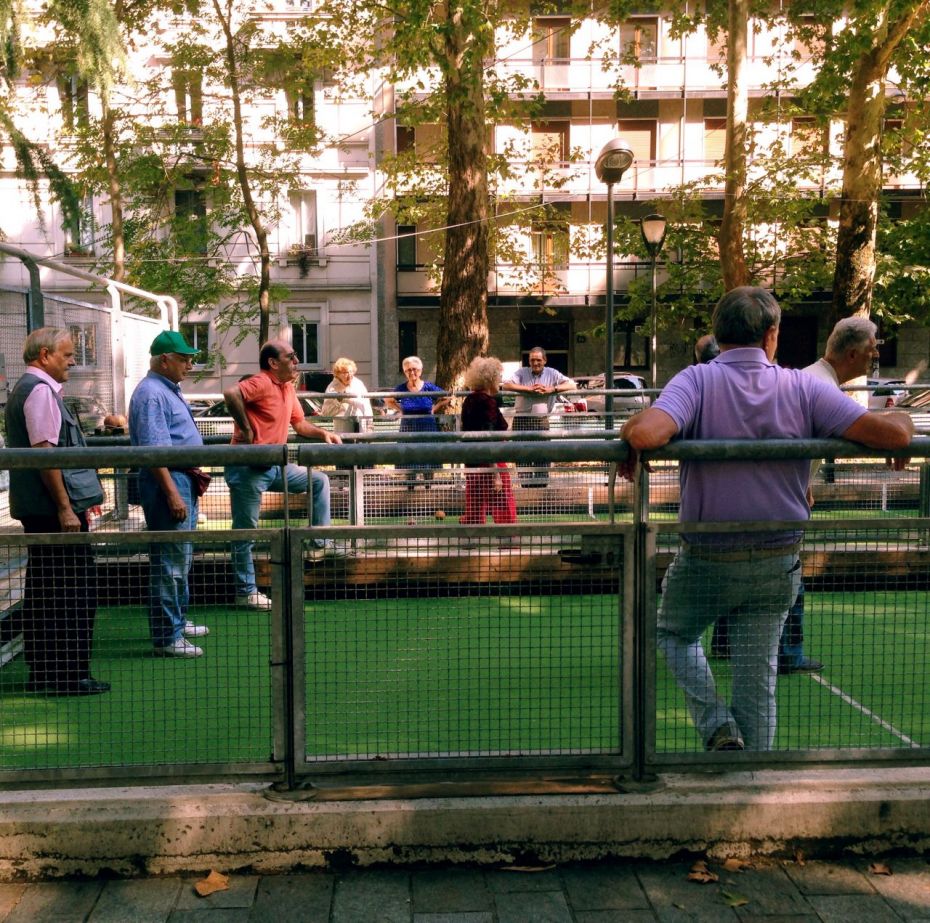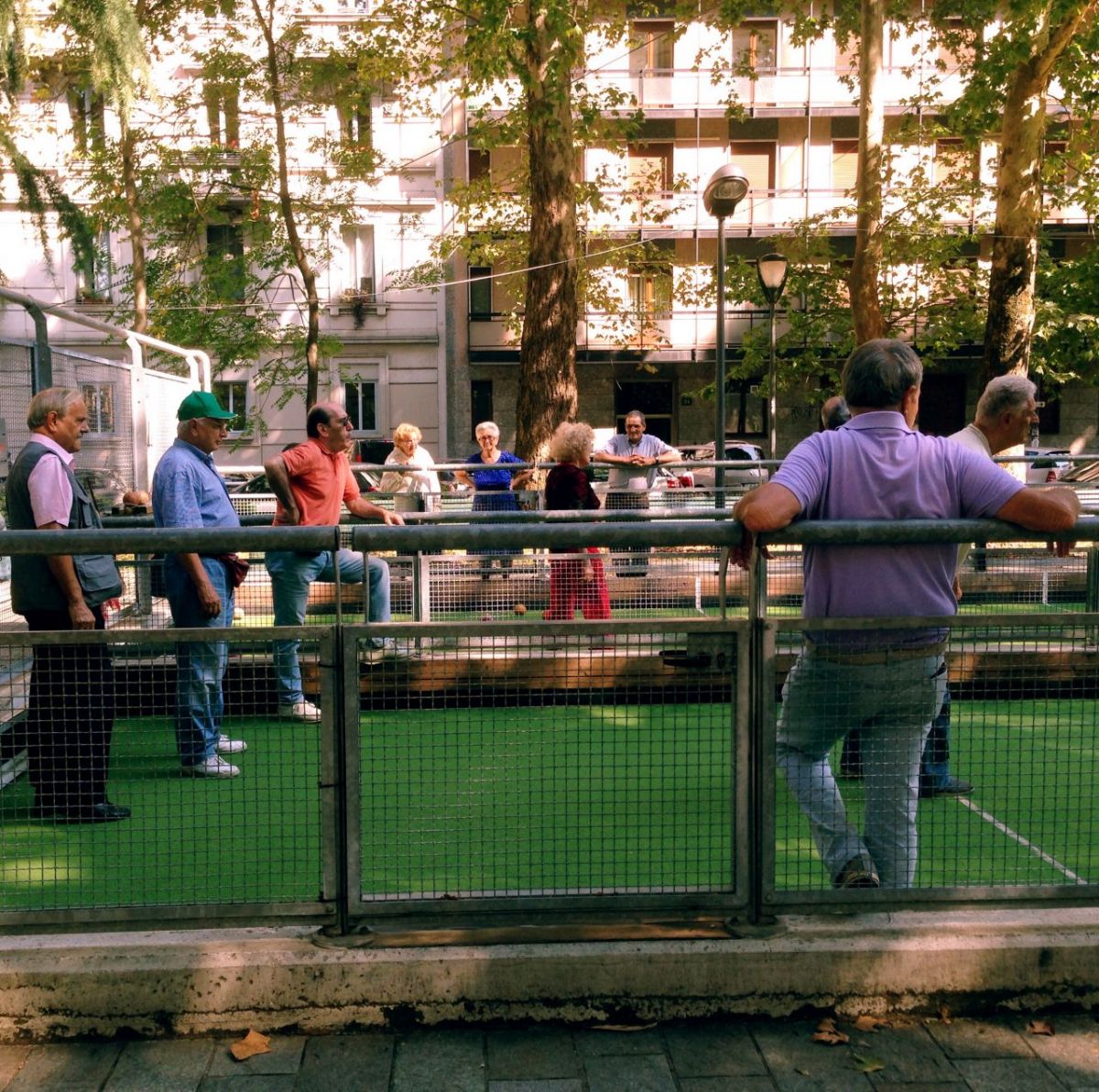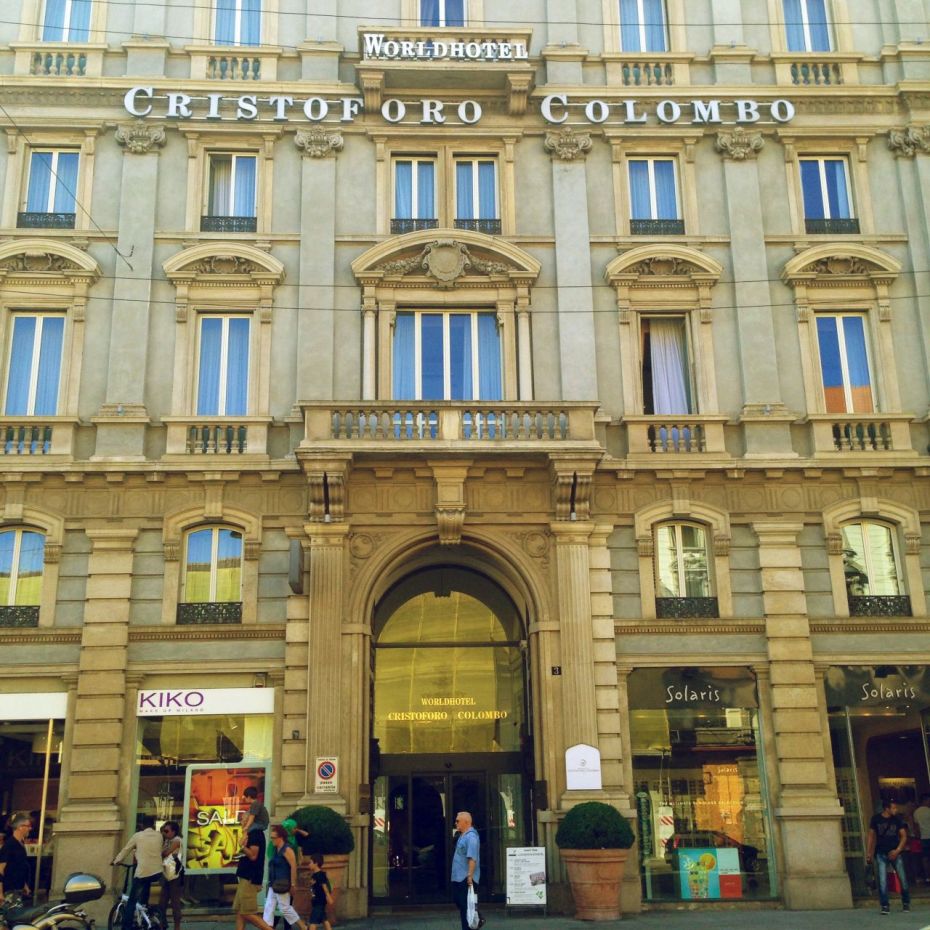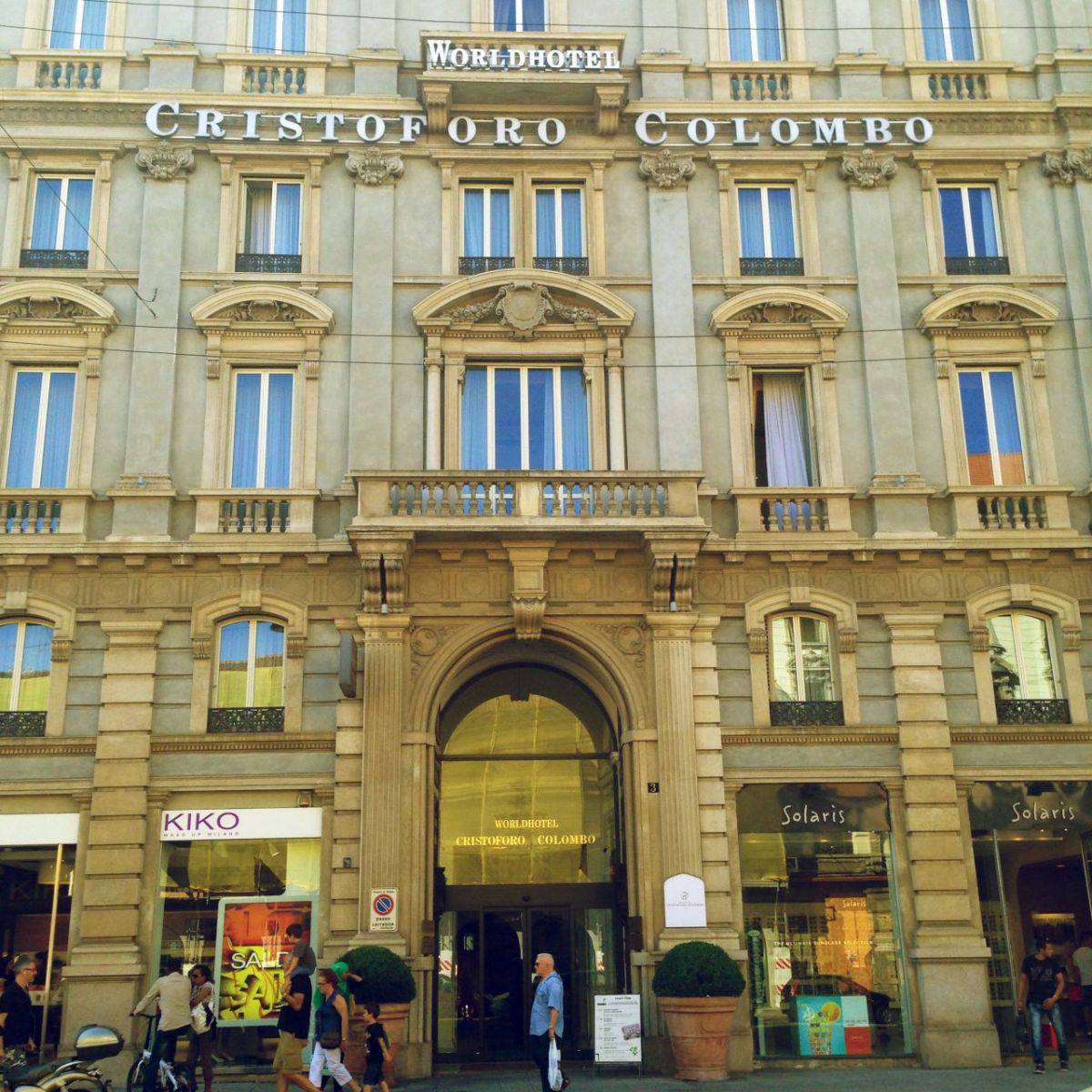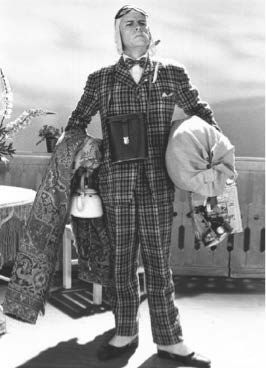THE STORY OF WILLIAM ONYEABOR AND HIS MISSING ITALIAN FRIEND
| August 4, 2014
Wednesday, July 23, 2014
In the early 1980's, William Onyeabor was traveling the world. He was establishing his own record company, Wilfilms Limited, in his hometown of Enugu, Nigeria, and wanted to service every aspect of the record manufacturing business—from recording and record pressing, to printing and shrink-wrapping the covers. The “Wilfilms Laboratory” and “Wilfilms Music Complex” was to be the greatest manufacturing plant in all of West Africa, and he wanted to have the best equipment the market had to offer.
He visited the offices of RCA in New York City and their pressing plants in Minneapolis; and, as I’ve shared with you before, he went to Sweden to get the best pressing machines of the day. He also traveled to Italy where he purchased his amazing Elka synthesizers (as well as the best tractors available at the time for Katapult, his semolina factory—a man of many interests!). In Milan, he found the best supplier of polyvinyl chloride, or PVC, which is used to make vinyl records. (In some inexplicable way during this period he also made the highly remarkable album Good Name!!!).
Whenever I speak with Mr. Onyeabor today, it seems like it’s these business ventures that pride him the most. He was a businessman more than anything, and the fact that he “did everything” within the business—not just for his own music but also for the other artists on his label—feels like the only thing from his past that he is willing to talk about (though he does so in such a vague way). Whenever I am with him, he will never speak about a particular song or album, but he will proudly point to the logo on the back of an album baring his own name, look at me and say, “I did everything, Eric. I even did the shrink-wrapping in my own factory.” Although he is one of the worlds' utmost music pioneers, it’s this incredible business mindset that always gets me.
It is also from these business ventures that he appears to have one of his life's greatest regrets. I don't know much about it, but what I've understood is that he is trying to find an old friend and business associate in Milan.
He can't remember the name of this person and he doesn't have any contact details for him, nor would he consider giving me much to work with—after all these years he still considers the matter "secret business information." All he was able to tell me is that the person was the Managing Director of the Ambrosio Plastic Company from 1984-1986 and that he was always very sincere and genuine. He told me this story:
"Once, he invited me to his home in the city of Milan, where he had beautiful living room, with a piano and a lovely white couch. He offered me to sit down and served me a glass wine, but I don't drink alcohol, so I had to decline. The Italians drink a lot of wine, but I don’t,” he said, and chuckled. "Years later something happened that I don't want to speak about… a business matter. I would like to amend it. I have to find him.”
For a man that doesn’t say much, he has told me this story many times, whether we are speaking over the phone or in the great living room in his palace. When I visited him this past February, he showed me an old delivery slip, xeroxed on pink onion skin paper, torn and dirty along the edges. He held onto the paper firmly, explaining, “This is a business document, I can not give this to you of course”. Always very secretive, I knew he would pull it away any second. I frantically began looking for a name or some kind of clue (speaking Italian, I figured I might see something he might not have detected earlier). In the top left corner was the sender’s address, printed with typewriter and stamped “1984”. Below was the Italian V.A.T. number, a very important clue, but far too long to try and memorize. “The Managing Director,” he said looking at me, pointing to a signature scribbled in faded black ink at the bottom of the paper. It was impossible to make out the name. “It is the Managing Director you have to find, Eric.”
He then pulled the paper away and put in on the big couch next to him. “Are they still in business do you think? Can you find him for me?” he asked.
A few hours later we said goodbye for the day and I jumped into the backseat of a cab to ride back to my hotel for the evening. I urgently pulled a small piece of paper out of my bag and scribbled down whatever I could remember before it was too late—knowing he would never show me that paper again.
As you might have heard, we have been organizing tribute concerts for him around the world: London, NYC, Los Angeles and a few summer festivals to date. It has been a beautiful thing—William Onyeabor’s music performed live for the first time ever, with some of the most incredible musians around. Everyone seems to be having the best of times—musicians and fans, alike!
After each show I call him and try to explain how the show went—he never played live himself, so I can tell it doesn’t really translate clearly to him, but he is always pleased to hear it's going well. Of course, I would like nothing more than if he would attend one of the shows, but each time I ask him to come over, he says that he can’t consider coming until “the Italian issue” is resolved. I know there are other issues as well, and that even if I were to find this man it would not guarantee his attendance, but I'm committed to giving it a shot.
I’m going to Milan next week to look for this man. If you know anything about this company, anyone that was working in this field around then or might have any leads that could help me along the way, please contact me at [email protected].
Wish me luck!
Much love,
Eric
PS: If you would like to read or share this story in Italian, here is a piece that Jovanotti wrote for us in the weekend edition of Il Sole 24 Ore.
Sunday, July 27, 2014: Viaggio in Italia, train from Roma-Milano
The plot thickens! Without even having arrived in Milan and the city where Mr. Onyeabor’s long lost friend is thought to live, tips from all over Italy have been pouring in—sending us in different directions across the country. We can not thank you enough for all the generous help we have received! Grazie mille!
Click through the gallery of the most helpful tips, so far.
Monday, July 28, 2014: Milano
Today we started the day by visiting one of the only clues Mr. Onyeabor was willing to give us when we last saw him in Nigeria—what is thought to be the former offices of “Ambrosio Plastics Company” located at Via Varese, 16 in Milan.
We were joined by Rivista Studio's Guia Cortassa, whose mother used to do business with the Ambrosio company in the '80s. After hanging around the building for a while, we eventually met a gentleman who let us into the courtyard. He has been living there for the last 30 years and explained that there was once an old printing lab in one of the basements—which could be the place we are looking for, but that doesn't sound completely right.
We've also got some new intel that the office was in fact outside Milan, in a suburb called Pioltello... so that's where we're headed next!
Stay tuned as the story develops and follow Luaka Bop on Instagram for breaking news and updates!
Monday Evening, July 28, 2014: Navigli, Milano
Breakthrough!
On a warm, humid day mirrored by heavy thunderstorms and empty, vacated streets, we spent the later half of the day in a weird limbo, as we anxiously waited for one of our leads to materialize. Marta Cagnolla, a journalist at Radio 24 and one of our agents in the city, had read the lovely piece Jovanotti wrote in Il Sole and jumped when she saw the name Ambrosio. Her father, Giorgio, pressed records for 60 years and once went into business with a former employee of Ambrosio’s. Together, Marta and Giorgio spent the weekend prior to my arrival trying to reach the family members of Giorgio’s former business associate, hoping that they might have some clues. It was our best lead to date, but left as in a nervous standstill throughout the day.
Then, later that same evening, we suddenly made another great break though.
Thanks to hours of hard detective work, Guia was able to find an advertisement by Ambrosio Plastic Company, published in an American(!) issue of Billboard in 1977. As you can see, the company’s address was listed as Pioltello—just like earlier intel had been indicating. Located just outside Milan and known for its many factories, we made plans to visit the town on Tuesday afternoon.
Writer’s note: When working on complex investigations of this kind, you always have to keep your eyes peeled for positive signs to lead you along the way. Here, the Billboard magazine was full of them: the issue did not just celebrate the great Italian company of Fonit-Cetra and the advent of “Hot New Salsa Music!”, but it was also published on our lead detective’s very own birthday—although a few years early, but still. Good vibes!
Tuesday July 29, 2014: Rain Delay
After learning that Ambrosio's main offices and factories were in fact in the Milanese suburb of Pioltello, we arranged to visit the town first thing yesterday—arrangements that immediately got put on hold due to heavy rain and severe thunderstorms. Italy is experiencing one of its rainiest and coldest summers ever, with many of the Italians complaining, "Piove, governo ladro!" (Meaning, "It's raining, and the thieves in the government aren't doing anything about it!")
Instead, we went to visit Il Sole 24 Ore, one of Italy's leading newspapers and radio stations, to talk about Willy and his time in the country. After meeting with Raffaele, photo editor at their award winning and widely appreciated cultural magazine, IL, we went upstairs to see our friend Marta Cagnola at Radio 24. Marta covers current affairs in music, film and the arts. Her pieces air daily after the morning news, and she does longer pieces on the weekend. As someone who is incredibly passionate about the project and has a direct line to 2 million listeners every day, we are very fortunate to have Marta on the case with us.
As mentioned yesterday, Marta’s father Giorgio has been in the music business since the '50s and pressed records for more than 60 years. When she showed him Jovanotti’s piece, he shouted out “Ambrosio!” and then, “No, non era a Milano… era in Pioltello!” In the '70s, Giorgio went into business with a man named Signore Berardinelli, who then was manager for the Ambrosio factory. In this new venture, they brought with them Berardinelli's secretary from Ambrosio. Signore Berardinelli passed away some years ago, but they were still in touch with his son Hugo. After trying to reach Hugo for a few days, they finally heard back from him and explained the situation to him. Did he have the number to the secretary or know how we could reach her?
Later that evening, Marta recorded a piece on William Onyeabor and his lost Italian friend for the news, to be aired Wednesday morning on Radio 24.
Wednesday July 30, 2014: Pioltello Pt. I
Wednesday's weather was on our side , so we finally ventured out to Pioltello. We boarded the train to Gabba, near the final stop on the line, and met up with Marco Carandente, who would drive us to Pioltello. Marco is a young, tech savy detective with a great won't-take-no-for-an-answer mindset—a characteristic you always look for in new agents. He'd been tipped off about the case by his brother, and spent the weekend searching through countless local databases, cold-calling more than fifty people in the Lombardy area. With a background in IT, Marco knows how to search for things, even when it seems like nothing is there.
As we drove out of the city, Marco explained that Pioltello is notoriously one of Milan's most crime-ridden areas, earning them the nickname ,"Il paese del coltello" (KNIFE TOWN!). Soon I understood why. Deserted, locked up and totally run down, yet still highly industrious in some weird way—Pioltello is the modern suburb equivalent of a spooky ghost town you would see in an old Western film. "Hold on to your stuff, okay?" Marco told me. "Oh... and be careful when taking photos."
We had three addresses that we wanted to investigate:
Via Brasile, 13: An unknown address, which kept coming up in Marco's database research.
Via San Francesco, 1: The address listed in the Ambrosio advert Guia found in Billboard magazine.
Via Varese 16: The address I first saw on Mr. Onyeabor's delivery slip in Nigeria, but which we hadn't been able to verify in Milan.
We started with Via San Francesco, but since GPS coordinates were often so inaccurate in these industrial parts of Italy, it took awhile to find it. We parked the car and began checking out different buildings—buzzing any buzzer that still seemed to work, knocking on whatever door we could see. No one was around.
Then we saw a few cars parked further down the road and headed that way. I couldn't tell what was inside the warehouse, but it seemed like the business was still running, at the very least—and we hoped someone was inside. Just as we were about to leave, a young man opened the door. We both knew that he was too young to remember anything from the '80s, but briefly explained the case and asked if could be of any help.
He walked us over to a neighboring warehouse, where an older man was working in a red jumpsuit. He introduced himself as Giuseppe. As we told our story and mentioned the word Ambrosio, he nodded his head and said "Si, si, mia zia lavorava li" (Yes, yes, my aunt used to work there). He looked us up and down again and asked one more time why we were inquiring about the company, then decided to give us her number.
We thanked him with a warm "Grazie mille!!" and ran back to the car. We needed to check out our other two addresses before everything would shut down for lunch time. If we got there too late, we would have to wait for a couple of hours for them to come back—the clock was ticking!
Friday August 1, 2014: Pioltello Pt. II
Just before lunch, we reached our second stop. Via Brasile 13 is located in what appears to be the center of Pioltello, with a few shops and residential houses nearby. Giuseppe explained to us that this was in fact the factory of Ambrosio Discografica—not Ambrosio Plastics Company, which he had never heard of. Although we hadn't been able to establish the relationship between the two companies yet, the former name kept appearing in Marco's databases, while the latter would never generate any search results. One theory we had was that the Italian name "Discografica" was its original and legal name, and "Plastics Company" was a named used for International marketing and customers outside of Italy. Both of us were convinced there was a connection between the two names; the chance of there being one company that presses vinyl records and another that supplies plastic for making vinyl records, both using the same family name and located in the same small town, seemed way too slim.
The center of Pioltello, with its various abandoned buildings, felt very much like its outskirts. At Via Brasile 13, the name of company last using the building had been crossed out with tape; the windows were locked up and a high fence protected the property. In an adjacent parking lot behind the fence, we saw a few parked cars and tried to figure out if there was anyone inside. Alas, no luck.
Marco suggested we look for an older person that could have been around in the '80s, so we walked down the street to a group of old men hanging out in front of a tabaccheria. Afraid to not scare them away, we approach them slowly.
"Uffa… Ambrosio erano tanti anni fa. Dopo erano Tailor ma né loro non ci sono più adesso…," one of the men complained. ("Ambrosio closed many years ago. Then there was a tailor at that address, but even they are closed now.") At the same time, two men who were on bicycles took off, while another one walked away. Fearing that all of them might try to ignore us, Marco asked a few more questions. A man in his late thirties stepped forward and offered to help out. His name is Lorenzo and he tells us that he has fond memories of when the factory was still active. "They used to give us that round center piece that's left from when cutting the vinyl and give to us kids to play with," he says, "Come on, I'll show you which one it is."
We walked back to number 13 and he explains that the place has been shut down for ages, the last owner leaving more than a decade ago. He didn't know anyone that used to work there, but explained that the main entrance was on the other side of the street—so maybe we should try there?
We rounded the the corner and were met by even more weeds and broken glass.
We asked a few more people if they have any information, but were almost completely ignored (the few responses we did get were merely to say they don't know anything).
A few minutes before the 12:30 lunch break and with no time to stick around, Marco suggests we try one more place.
Monday August 4, 2014: Pioltello Pt. III
At 12:30 we pull up in front of Commune di Pioltello’s offices. Built in 1980, this ambitious and futuristic community center is a round, cement building that more looks like a spaceship than anything else. Across the facade there are panoramic red windows—like a command center, and on each side there is a lower building with triangular stairs, kind of like wings. In one of the wings we find La Biblioteca Comunale di Pioltello, which to my great surpise is still open during the lunch hours. We make our way to the second floor, where we find a section on Pioltello and its history. As the sun starts peering through the clouds outside (after days of endless raining!), I can’t help but think how wonderful it is to be locked inside a long-forgotten library, in this long-forgotten town of suburban Italy.
“Here,” Marco says and hands me a few heavy binders, “Why don’t you start with these?” In front of us are two bookcases dedicated to the history of Pioltello. With some time to spare before the community office reopened after their lunch break, we started to go through all sorts of information that isn’t accessible online: local newspapers and books, company registries and annual reports of various clubs and organizations— all dated from some time before the digital revolution. “Here!” Marco shouted almost instantly. He read a report of companies in Pioltello from the '60s, and at the very top it read, “Ambrosio Discografica, Via Brasile, 13 (1961),” and then on the next line, “Ambrosio Plastic C., Via San Fencesco 1 (1966)." “Ha!” we both exclaimed, looking at each other in disbelief at uncovering this important piece of information.
So there were two companies!
Next to the two names was a short description for each of them: the first was in the record manufacturing business, while the second was in plastics and chemicals. Not being able to determine the relation between the two companies before, this felt like a good step forward.
We started digging through the rest of the material on the shelves, but after a few hours, could find nothing more to support our theory. We packed up and walked across the small square to the main office of the space ship community center. Inside we were dissapointed to find no continuation of the sci-fi vibes—just the waiting room of an Italian government building. Afraid that we would have to take a ticket and wait in the long line (The clock is ticking, no time to lose!), Marco elegantly slipped past the main service counters and found a general information desk in the back of the building. After explaining our quest to a young clerk and her supervisor, they give us approval to pass the security turnstile (somehow this place also manages to look like a subway station!) without waiting in line and go to Signore Corrado Boneschi on the second floor. They were convinced he might be able to help us.
Signore Boneschi waves us in to his office and politely invites us to sit down. His desk is immaculately organized with a pencil, a ruler and a stapler perfectly aligned on his right side, and a small stack of papers on his left. On a shelf next to him there are five stamps in a stamp holder. I was dying to take a photo of his office, but only managed to snap a few from my seated position (which, you can see below, doesn't capture what I am describing). As Marco explains the case, Sig. Boneschi starts typing quickly on his computer, grimacing each time he gets a new result. Marco, the IT expert on our team (who probably has searched the same databases Sig. Boneschi is now looking at), feeds him different suggestions as we go along. As the dialogue quickly picks up, and with the two of them speaking too fast for me to understand what they are saying, I begin to sense that we are onto something.
“Ecco!” Marco says and points to the screen, “this could be something.” He is pointing to the name “Avv. Cannada” and an address in Milano. Next to that I see “Nascita: 1926” —born in 1926. Marco explains we are looking in the registry of the Casa di Commercio, and in particular at documents detailing the municipal proceedings that took place when Ambrosio Discografica went bankrupt in 1989. “Abrosio’s lawyer at the time was a man named Salvatore Cannada Bartoli. He lives here in Milan!” he says eagerly. “Right… but doesn’t it say he was born in 1926?” I ask, trying not to get too excited. “Is he even still alive?” I wonder aloud, as I try to mentally calculate how old he must be now. “Well, the registry says he is… and it even says he is still working. Amazing! Come on, lets go!” Marco says, ready to continue the search.
We thank Sig. Boneschi for his help and turn to leave. “One sec,” he says, “Let me just show you guys this.” He brings up his phone and starts scrolling through the photos. “This is my sound system at home. I love music! I built this myself,” he says, looking at us hopefully. Then, snaps back into official government employee mode to say, “Oh and guys, you know I'm not usually supposed to show you all this stuff… like all that information in the computer. Lets just say you got it from someone else, okay?” he says and winks.
We ran out of the building and back to the car to begin the drive back to the city. It feels so great to finally be leaving Pioltello with a concrete lead.
Monday August 11, 2014: A New Lead!
Three weeks into our investigation in Italy and our hotline is busier than ever. Tips keep pouring in from all over the country! (Again, we cannot thank the kind people of Italy enough for their wonderful help in this important investigation.)
Here is a fresh tip from someone claiming to be a relative of the man we are looking for—wow!! Stay tuned as we investigate this exciting new lead!
Do you know anything about William Onyeabor’s missing Italian friend? Please let us know at [email protected].
Thank you
Bop, Luaka
Private Detective
Friday August 15, 2014: Standstill
Since the beginning of August, Italy has been on holiday. Everyone has gone away and every single office we visit is closed—nobody is even picking up the phone. A heavy sense of melancholy has swept over Milan. Streets are deserted and quiet. Many of the bars and shops are closed, with pulled down shutters covering the windows, and heavy locks over the doors. The rain keeps pouring down in what everyone is calling the coldest summer since the '60s. The few people we actually meet ask us what we are doing here. We can't help but do the same.
What's the next step? Is it time to pack up and leave? Maybe we can’t find this guy. Or maybe now is not just the right time? For days we have been tracing our last steps, feeling helpless. Have we missed anything? Could we have asked a few more questions? Should we try that person again? What about that woman we met last week, we haven’t heard back from her… Or that man at the cafe…
We know that patience is the key to this game, and if you don't have patience you will never succeed—especially in the case of William Onyeabor. Where would we be right now without patience? It took five years just for him to sign that damn contract. And that year of researching about him while trying to get all those interviews for the film documentary. All those trips back and forth to Nigeria, just to sit with him in his living room and watch religious television shows for hours and hours, day in and day out—what's a couple of weeks in Italy? There are worse places one could be stuck, right? We can’t give up now.
Towards the end of the afternoon, the sun peeked out for a few hours and we went for a stroll. We found a small park where a group of seniors were playing bocce. After all this rain, it's probably the first time in a while they have been able to play. Everyone was smiling, the sun light warm and soft. On one bench next to the field, an old men read the paper, while a younger man slept on another bench nearby. Next to him, a group of ladies were happily chatting. At the end of the park stood a small flower shop, with sun flowers on display in the front. The flowers were huge—almost twice the size of any sunflower I've ever seen in New York.
We continued down a small street from the corner of the park, and eventually turned onto Corso Buenos Aires—a wide boulevard that leads from Porta Venezia, one of the historical gates that surround Milan. We stopped into a small fruit and vegetable stand, one of the few places that is open, and bought some figs. The fruttivendolo is a kind, young man from India and together we spoke in Italian. How great it is to converse with someone from another country, in a language that also is foreign to them.
With so much beautiful fruit in season, it’s hard to just settle for figs. Late summer in Italy means wonderful fruit in abundance. A few blocks down, we saw a large sign for “Hotel Cristofo Colombo.” We can't help but love Milan in this moment—the city where fancy hotels are named after one of the great detectives of the world. Of course, it could also be after that Italian explorer from Genoa, not too far from here. But without doubt it must be after Lt. Columbo, the world famous detective of the Los Angeles Police Department. Surely, the Italians must have just changed his name a little to make it sound better in Italian.
We decided to go inside and check it out. It was almost 7pm and time for an aperitivo. Perhaps this isn't such a bad place after all.
Wednesday August 20, 2014: Life As a Detective Pt. II: Disguises and What To Wear
As we have officially reached a standstill in the case, we want to take a moment and respond to the many letters, postcards and telegrams that we’ve received in the last several weeks.
It has been wonderful to hear from so many of you around the world, with tips about new leads, theories about where the long lost friend might have gone, and questions about the detective business and what it is like being a private investigator today. To all of you who have inquired about new cases and asked us to take a case in your hometown: we are unfortunately fully committed to this case and we can not take on anything more in the foreseeable future. This also includes cold cases involving Presidents, Prime Ministers and Hollywood movie stars. Thus is specifically directed to all of you who keep asking us to take over the JFK investigation—this is something we have explained time and time again to our local news reporters in New York City—it’s just not happening. Sorry.
Many of you keep asking for advice on how to conduct a successful private investigation, so today we would like discuss the importance of appearance—choosing the right clothes, and, most importantly, why you must always prepare to have a few good disguises handy when you are on the road. Remember, private investigations can be a very dangerous business, so be cautious out there and take care of yourselves. And never forget the golden rule: Safety first!
As we’ve been scouring the streets of Milano and its far more dangerous suburbs—conducting tense interviews and sneaking into private properties, locking ourselves away in dusty old archives and basements of public libraries and community centers during the day, and rattling away on our keyboards as we explore the vast databases of the Italian intraweb at night—it’s not just our weathered Jake Gittes-style mindset that’s managed to get us out of the worst of jams, but also our perfectly balanced appearance, and chameleon like disguises.
If you ever find yourself working on a complex investigation like this, it's always good to have a few disguises handy for a day out in the field. This becomes even more important when working abroad, away from home and what you know. You should always prepare for being on the road longer than expected and bring enough supplies with you so you don't become limited in your appearance. This can mean bringing tools and equipment for quickly altering your facial appearance (hair dye, a razor and a pair of scissors usually does the trick) or packing a few extra clothes and accessories in your bag that can give multiple identities: hats, wigs, makeup, temporary tattoos, etc.
As a detective, you are always aware of the impression you are making on the people you come into contact with on the road. You may want to scope out an area prior to making contact with the suspects there—meaning, during the first visit you don’t want to be noticed and then in the following, you not only want to be noticed, you want to be remembered. Considering the nature of this case, where much of our work is door-to-door questioning of non-threatening potential leads, it is crucial to look as unassuming as possible.
If you are dressed too well people might mistake you for being very wealthy. Sometimes this is helpful—like when you need to gain entry into a fancy party to question a millionaire, but other times it sets you apart from everyone else in a negative way. When people assume you've got lots of money, a phenomenon happens where you are treated differently, which can lead you down false trails. We have all seen films where a couple bucks can buy a tip or two from someone on the street. However, you can never know the authenticity of that tip and many times it will put you on the wrong road. Unfortunately, this still happens to this day.
At the same time you don't want to look too shabby, either. No, it's important to find the right balance and when working on cases abroad that can be easier said than done. People often dress differently—have different trends or definitions of acceptable public dress—than where you live and blending in can sometimes be the biggest obstacle to moving the investigation forward.
For instance, it is common knowledge among seasoned investigators in the global detective industry today, that Italy is one of the trickiest places in the western world to blend in to. Traditionally, this is home to some of the most well-dressed people in the world. At the same time, it doesn't have the same diversity as our hometown of New York City—where you can go practically unnoticed donning a cat costume, a fresh mohawk or wearing barely anything at all. It seems that more than any other place we’ve ventured, Italians are able to spot foreigners from miles away.
When we were to investigate a highly critical lead last week, we found the solution to this problem in the legendary detective, Ture Sventon. Det. Sventon had an office in the center of Stockholm and solved cases all over the world during the later half of the 20th century—many times finding success through the use of ingenious disguise. He traveled to England and made his way through the heavy fog of London, dressed like a classic English gentleman. On another well-documented case that involved a missing camel, he went to Egypt on a flying carpet and dressed as a traditional herdsman. Although genetics bestowed him with the traditional Scandinavian look of blonde hair, blue eyes, and fair skin, his disguises never gave him away.
In one legendary case, he investigated a series of burglaries taking place in a small town outside of Stockholm. Det. Sventon quickly understood that the perpetrator was the renown crook known as, “Wilhelm The Weasel.” He ingeniously decided to dress up like a child, so he could blend in with the kids playing on the street, where the burglaries were taking place. Wearing a classic baseball cap with a propeller on top, an oversized shirt and a pair of shorts—all in summer pastels—he looked like any ten year old kid. He was able to spy on one of The Weasel’s accomplishes as they were casing new houses to break into. A few days later, he was able to catch the crooks red-handed.
We kept this specific trick in mind last week, when we were knocking on doors in the center of Milan. We had been given the address of a former Ambrosio business associate, whose office was a short walk from the Duomo. When we arrived at the address, we couldn't see the man's name on the registry downstairs and assumed he had moved. We found the porter of the building, who was surprised that we had such an old address. He eyed us up and down suspiciously, hesitating about giving us the new address, then sighed and mumbled, "Va bene... lui sembra 12 anni." (Alright then... looks like that guy is just 12 years old anyway.) He jotted down the details for us on a piece of paper and told us to run along. The disguise had worked, once again.
